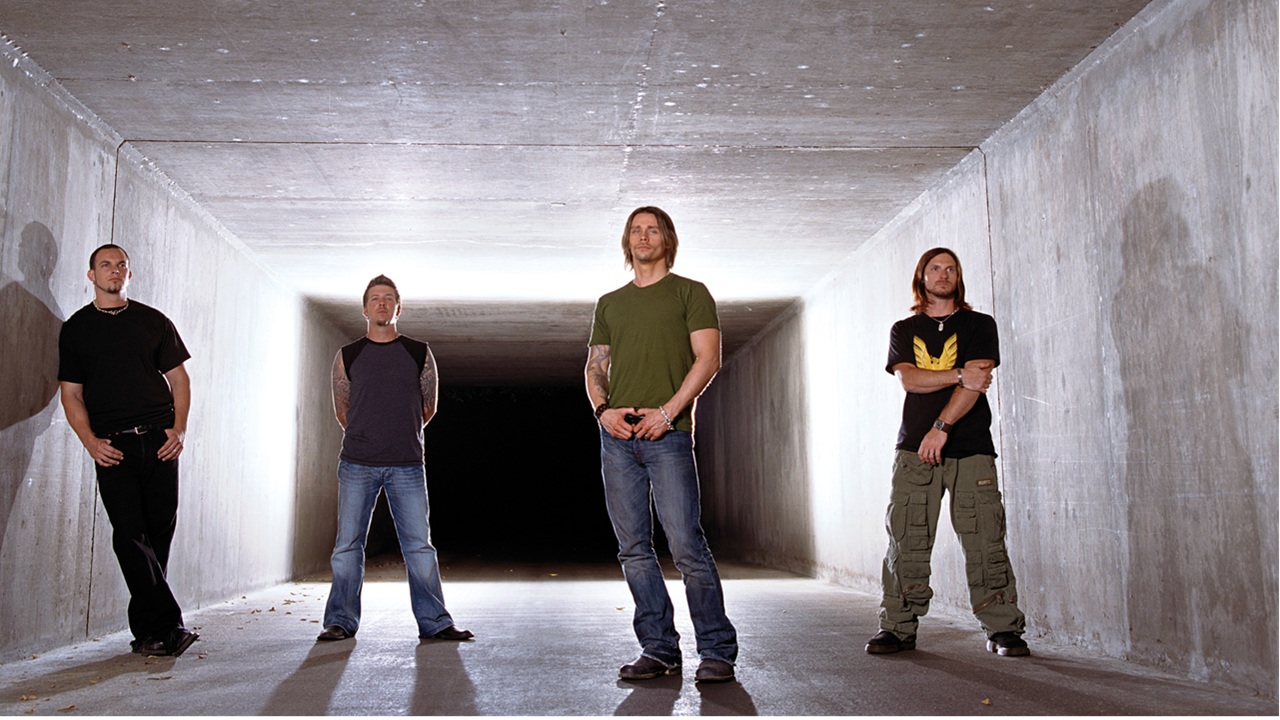The 50 best rock bands of all time
A definitive guide to the very best rock bands to ever exist
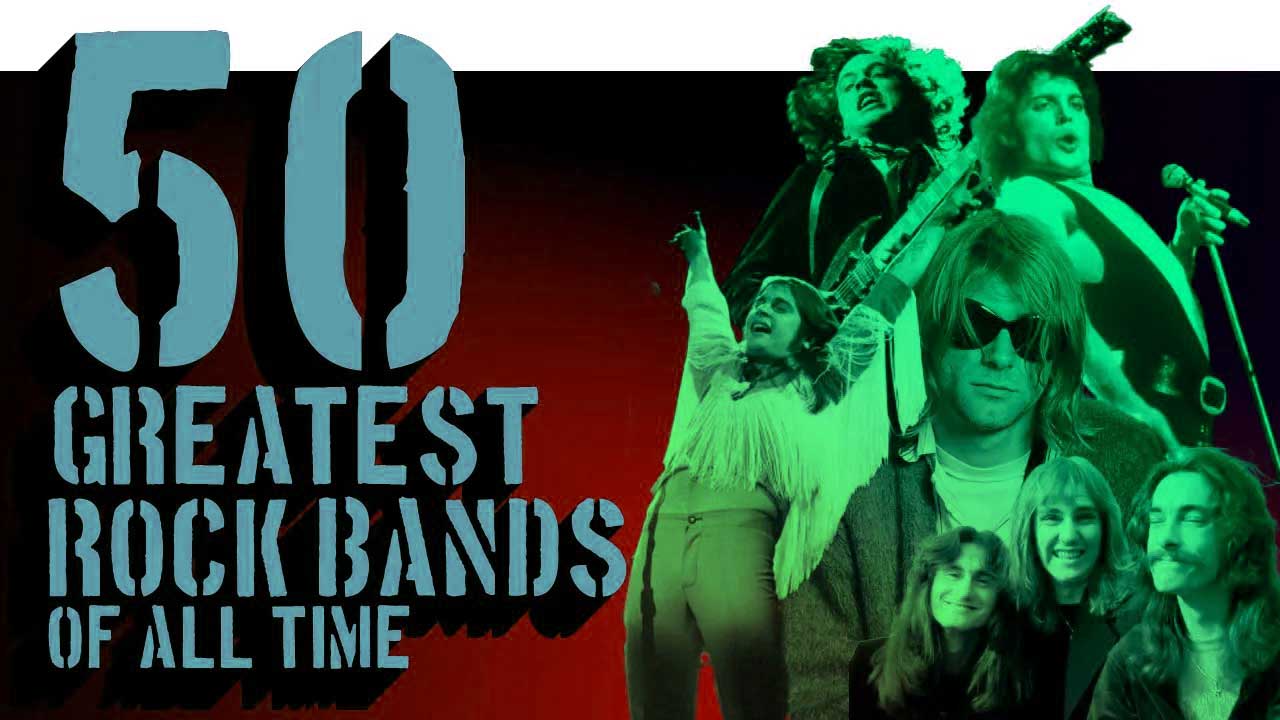
Select the newsletters you’d like to receive. Then, add your email to sign up.
You are now subscribed
Your newsletter sign-up was successful
Want to add more newsletters?
In the history of great pub debates, it's one of the arguments most likely to spill over into violence and end friendships forever: just who is the Greatest Rock Band Ever?
Ask most people, and they'll tell you it's The Beatles. Received wisdom and all that jazz. And it's undeniable: there's a fair bit of merit to that answer.
But when we got to compiling the definitive guide of the best rock bands of all time, we wanted to go deep. We didn't want to leave a single rock (yeah, pun very much intended) unturned.
So, we turned to you guys. You're not most people. You're proper music-loving rock fans, representing pretty much everything under rock's vast umbrella, and you think differently. And that's why we asked you to settle the debate, for once and for all.
We asked you to vote for the Greatest Rock Band Ever. We set up a poll, and you came to vote, in massive numbers. Tens of thousands of heartfelt, possibly controversial opinions. And when it was all done we took the data, wrangled it into an enormous spreadsheet, and performed some complicated calculations.
The results, as they say, are in. There's some pretty surprising entries, and some no-not-surprising entries.
But here they are. The 50 Greatest Rock Bands Ever. Official. As voted by you.

50. Roxy Music
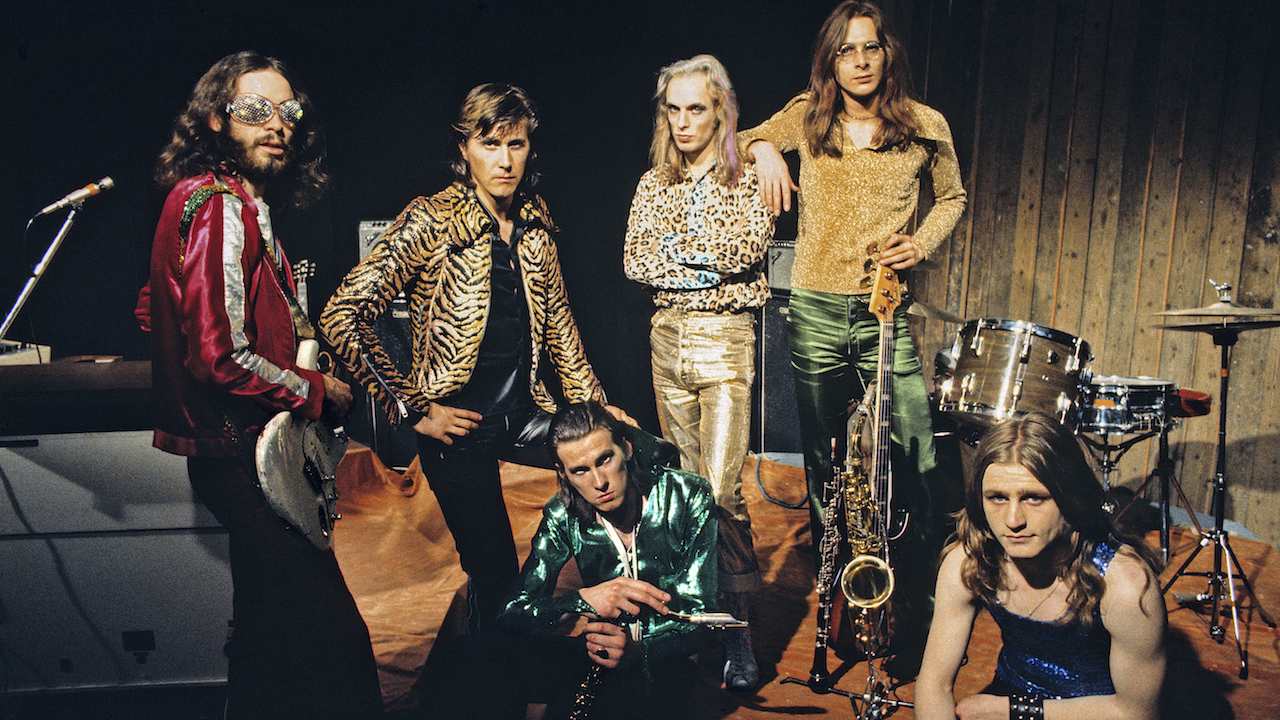
Roxy Music guitarist Phil Manzanera might have been right when he told Prog magazine in 2017 that the band "could have been bigger had we had an amazing manager – we’re our own worst enemies.” Certainly they could have been more successful in America, had they been prepared to put in the necessary “graft” (Manzanera’s word) and do the requisite hefty long tours.
"That’s Roxy for you," concluded Manzanera. "The career strategy is non-existent."
Still, they didn’t do badly. The group where a young Bryan Ferry and Brian Eno cut their teeth, they dominated Britain’s glam-era pop scene in the first half of the 70s, despite having next to nothing in common with Slade, Sweet et al and not being a pop group – or even a rock group. A band of "inspired amateurs" (again, Manzanera's words), they were essentially a band of punks five years ahead of schedule.
Roxy’s stylised glamour was catnip to the new romantics, their sense of provocation a beacon to the punks. Fearless and with a taste for overt experimentation, Roxy were radical and exciting, pushing boundaries without any concern for commercial compromise. Combined with their powerful songwriting and the band’s devotion to individuality, it was a potent combination that ripped up the rule book of what it meant to be 'rock', and we were all the better for it.
Sign up below to get the latest from Classic Rock, plus exclusive special offers, direct to your inbox!
Their contribution to rock was cemented when they were inducted to the Rock and Roll Hall of Fame in 2019.
49. King Crimson
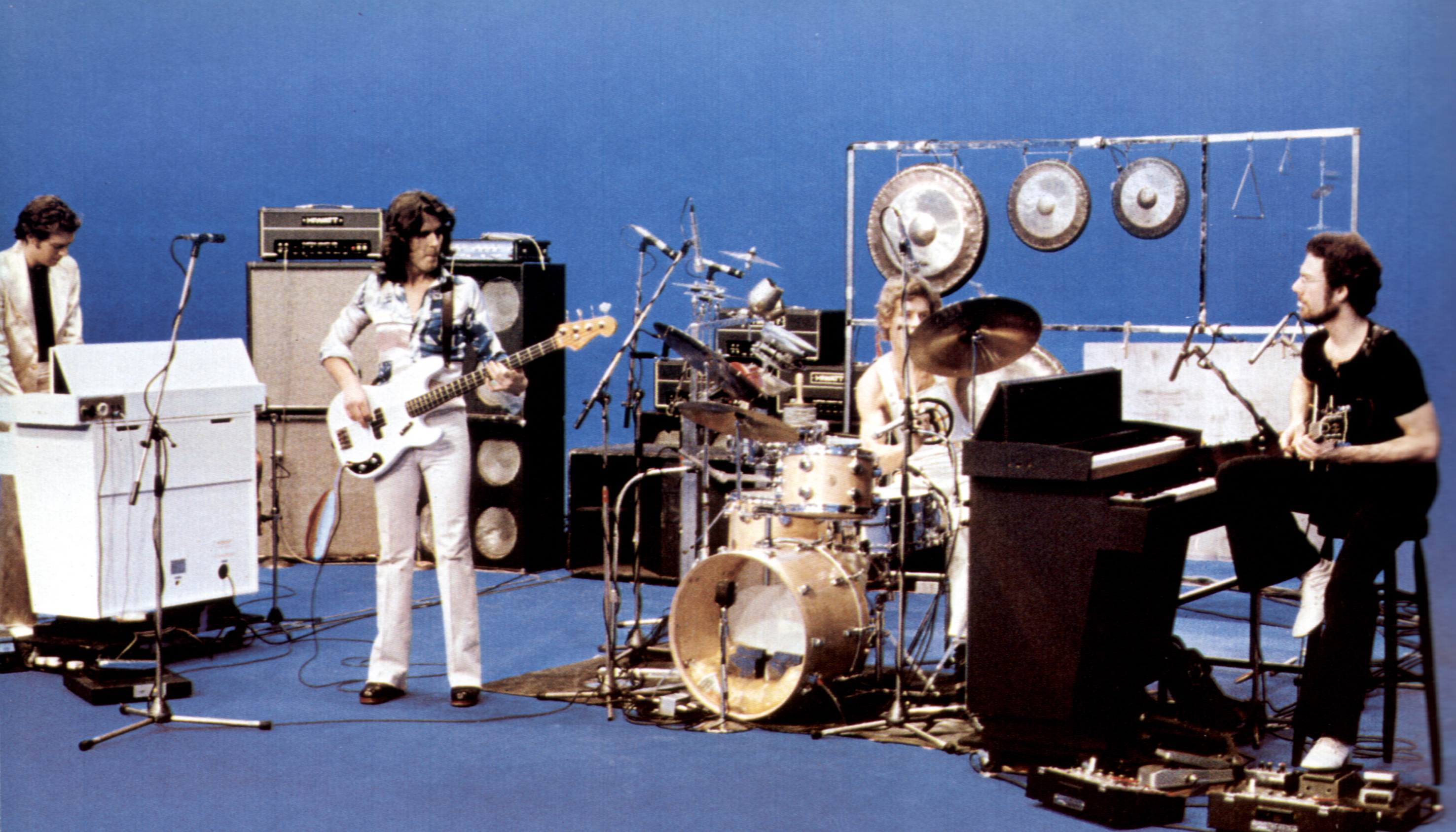
Forget a linear career; there’s nothing stable or logical about the way King Crimson have conducted themselves since forming in 1968. This most exhaustive and exhausting of prog rock bands have had nearly two dozen full-time members across five decades.
Their mid-70s drummer Bill Bruford once called Crimson “a terrifying place”, and that’s perhaps the best description of the band started by guitarist Robert Fripp and drummer Michael Giles, when their previous band Giles, Giles And Fripp ceased to be of interest to them.
The pair abandoned that trio’s whimsical pop in the pursuit of more headstrong – or head-fuck – music, and brought in multi-instrumentalist Ian McDonald, bassist/vocalist Greg Lake and lyricist Pete Sinfield. Since then Fripp has remained the sole constant.
It’s easy to suggest that it’s Fripp’s vision, his drive, that has kept Crimson at the forefront of pioneering yet idiosyncratic music. But he’s done more than that. Understanding that creativity is often born out of turmoil and disagreement, he has often brought in highly talented, strong-minded people.
This has led to a body of work that is not only the envy of many of their peers, but has also become hugely influential. Bands such as Tool and Porcupine Tree have cited Crimson as major inspiration, but they have reached far beyond the progressive world – Kanye West sampled 21st Century Schizoid Man for his 2010 hit Power, and British techno band Opus III covered I Talk To The Wind in 1992.
It’s no wonder the tentacles of Crimson have touched so many disparate artists. They have never stood still and developed in a single direction, instead reaching out through all corridors and textures within music. This has taken them on a journey not only through the usual pastures of jazz, classical, blues and folk, but also across the globe in terms of their reach.
Yet against the odds they have also had some considerable commercial success – eight of their albums have made the UK Top 40. The brilliant 2021 documentary In the Court of the Crimson King might be a full stop – Robert Fripp has suggested as much – but the music continues, with the Crimson-affiliated Beat currently touring the US playing music from the band's three 1980s albums.
48. ZZ Top
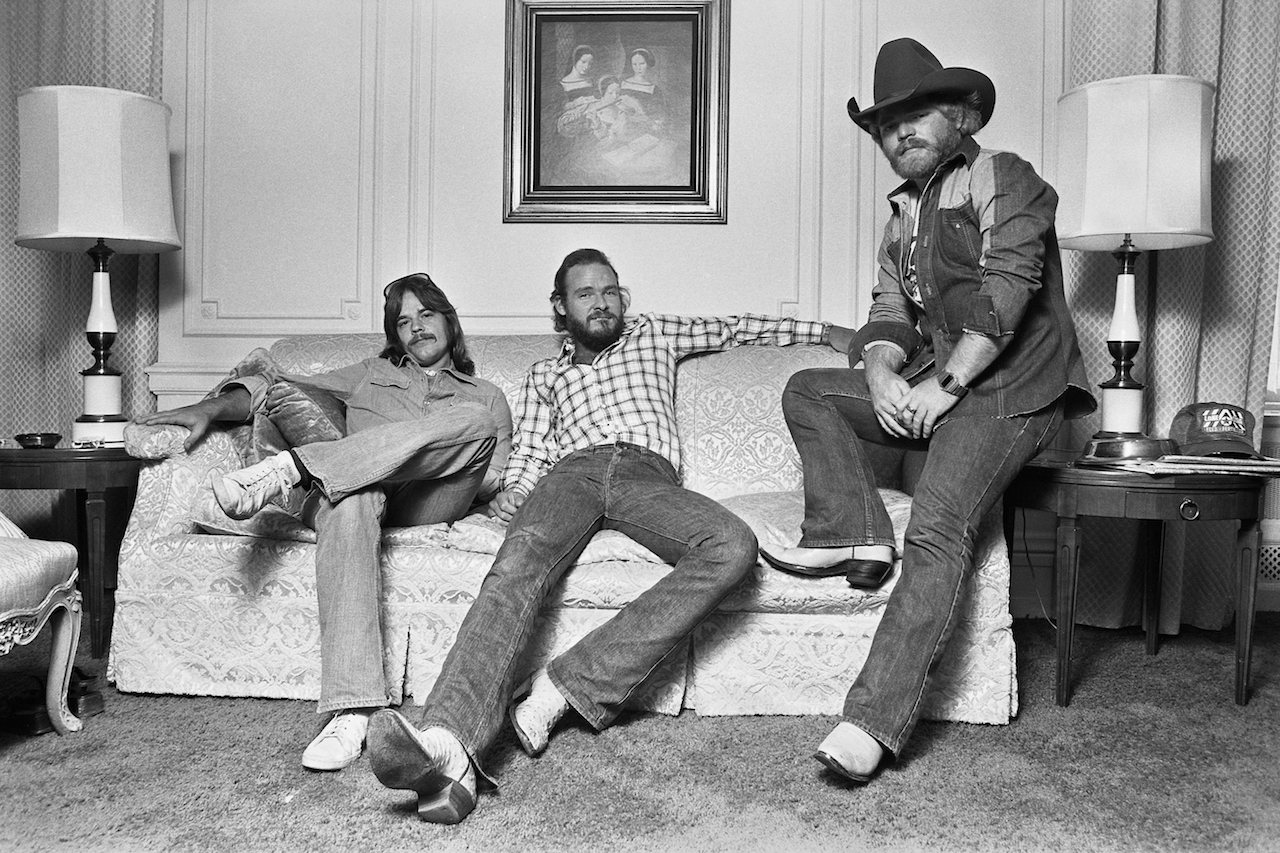
Two guys with beards, and a guy called Beard who doesn’t have a beard. Those 1980s videos. The car. The keyring. The furry, twirling guitars from Back To The Future III... To many people those things are the essence of the self-styled Li’l Ole Band From Texas.
But such memorable images are far from being the band’s only contribution to rock. ZZ Top – Billy Gibbons, Dusty Hill and Frank Beard – are certainly among America’s musical elite; a band who took blues rock, gave it a Texan tweak, and have for more than 50 years made gutsy music that amuses, amazes and gets your body moving.
From their Houston beginnings in 1969 when guitarist Gibbons, then with The Moving Sidewalks, teamed up with bassist Hill and drummer Beard from The American Blues, ZZ have defied convention. They made such an impact with their first three albums – ZZ Top’s First Album, Rio Grande Mud and Tres Hombres – that they were soon one of the biggest live attractions in the US. In the mid-70s they proudly had a map of Texas as their stage flooring, and had cacti and corralled livestock on stage with them.
After 1976’s Tejas, the trio decided on a three-year break, returning in 1979 with the Deguello album, by which time both Gibbons and Hill had grown those trademark beards.
Outside of the US, ZZ Top remained a cult phenomenon... until 1983’s Eliminator appeared from out of nowhere and rearranged the charts. The logic was simple: easy-on-the-ear songs, a modern production, and MTV-friendly videos that had a potent mix of sex, laughs and hardware. Suddenly ZZ Top were everywhere. Like Aerosmith and Alice Cooper would do later in the decade, ZZ had reinvented themselves. And with staggering success.
Of course, it was never going to last. Within a few years their commercial star was on the wane – at least as far as record sales were concerned. It didn’t bother them. They even survived a scare when Hill inadvertently shot himself in the chest while taking off a boot (don’t ask). In 2021, they did lose him after a long period of illness. His bass tech, Elwood Francis, stepped into the role.
ZZ Top have become a treasured American institution; icons who love to upset the establishment. And they're still going: Gibbons says that a new album, recorded when Hill was still alive, is in the bank.
47. Ramones
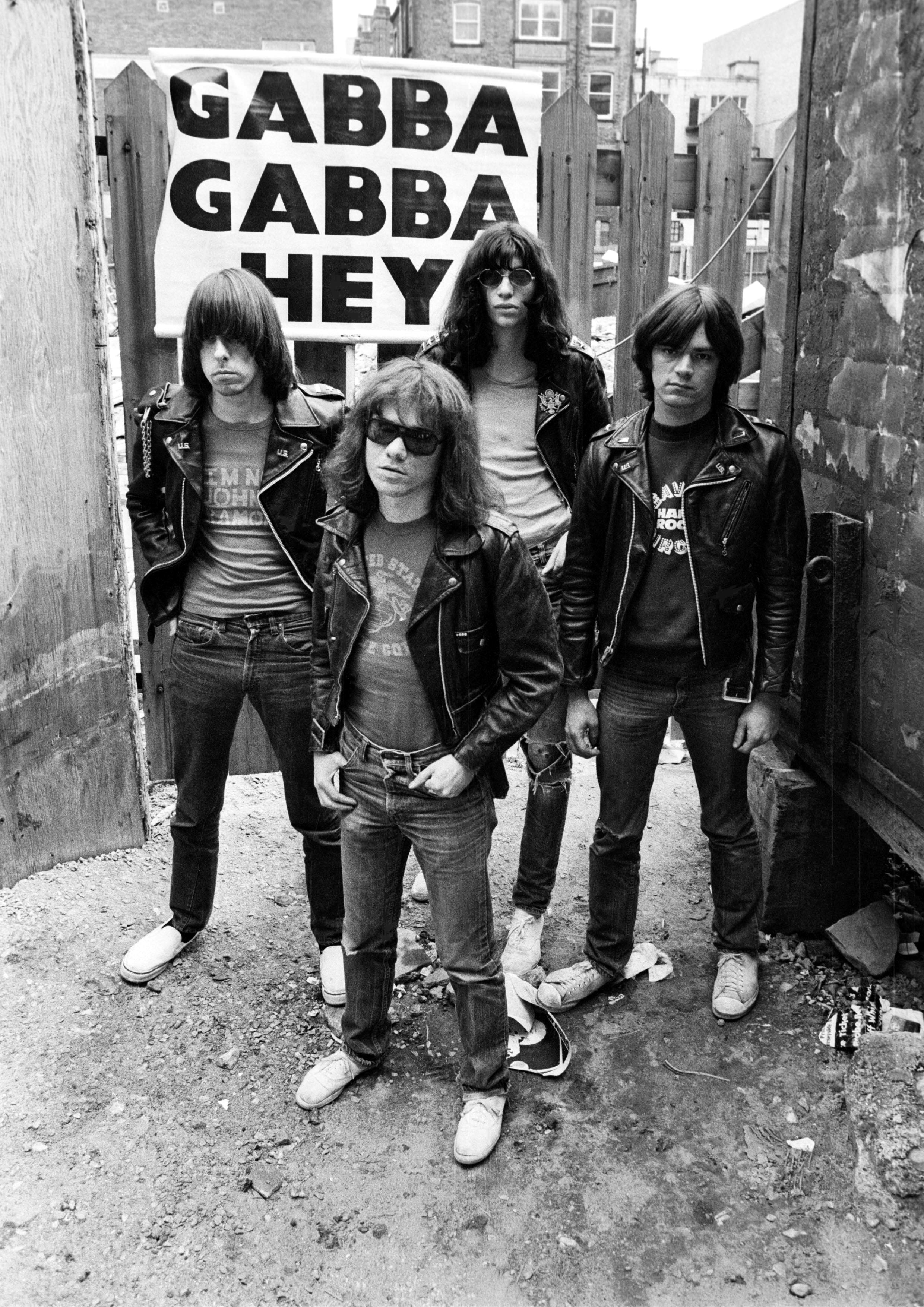
Frayed and ragged like well-worn sneakers, the bubblegum blitz of New York’s Ramones was as simple and blunt as a mallet. As with Motörhead and AC/DC, casual listeners will argue that if you’ve heard one Ramones album you’ve heard them all. Then again, if it ain’t broke, don’t turn into Metallica.
Born in 1974 at New York’s legendary CBGB dive, the musically unschooled and outwardly unwashed Ramones unwittingly scribbled the book of 1-2-3-4, do-it-yourself punk rock. Along the way they became slouched heroes to future generations of speed freaks, grunge geeks and pawn-shop guitar slashers with neither the dexterity nor the inclination to mimic Led Zeppelin or Eric Clapton.
Nicking their fictional surname from either Paul McCartney’s one-time pseudonym (Paul Ramone) or producer Phil Ramone (depending on who you ask), the founding fab four ‘brothers’ were singer Joey (aka Jeffrey Hyman), guitarist Johnny (John Cummings), bassist Dee Dee (Douglas Colvin) and drummer Tommy (Tommy Erdelyi). The Ramones managed only one gold album (1988’s double-vinyl ‘hits’ compilation Mania), but spent nearly 30 years inciting pogo pits and forging the loud-and-fast blueprint that would inspire everyone from the Sex Pistols to Guns N’ Roses.
While Ramones concert tours stirred mania overseas, they barely registered a blip on their US homeland’s radar.
Praise was hardly faint, however, as no less a bruiser than Lemmy himself wrote a namesake tribute to the Ramones for Motörhead’s 1916 album. On the more profitable and polite side of rock’s velvet rope, U2’s Bono and Pearl Jam’s Eddie Vedder both continue to be outspoken in their utmost respect for the black-leather boppers.
“I was at college when an advance copy of Ramones came into one of the local record stores," Nirvana producer Butch Vig told us in 2016. "I remember being in there when the guy put it on, and just being floored by how amazing it sounded. So I went back a week later and was first in line when it went on sale.
"It really was a startling sound for that time. There were all these bands like Emerson Lake and Palmer that would do these extended muso solos. The Ramones were the exact opposite of that, they were so stripped-down and bare-boned and so fast. It was a breath of fresh air, an adrenaline shot.
"In some ways I look at it as an analogy to when I produced Nirvana’s Nevermind. It’s the same kind of thing, where the music sounded fresh and vital and really shook up the music scene. The difference being that Nirvana sold out about 25 million records and the Ramones never sold jack-shit. For all their credibility, they never got played on the radio and thus never sold many records."
In 2002 the underdogs were finally thrown a bone when the Ramones were inducted into the Rock And Roll Hall of Fame. Sadly, 49-year-old Joey was denied his due, having died a year earlier in the grip of lymphoma.
46. Journey
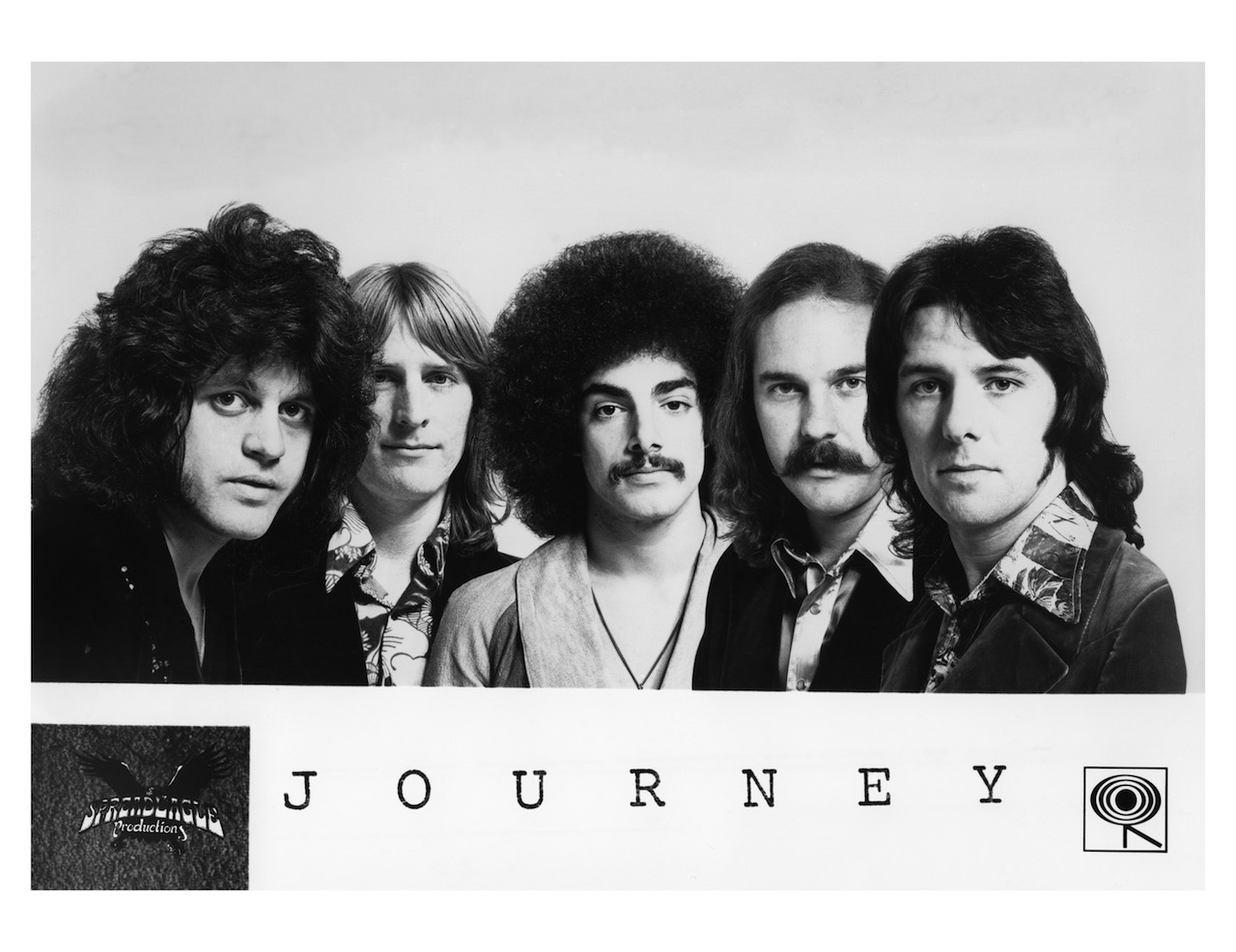
For many, Journey are the band who define AOR better than anyone else. Their catalogue glitters with anthems, which not only have massive choruses, but also the sort of musicianship you might expect from a band who began life as jazz rock instrumentalists, before embracing the melodic rock style for which they’re renowned.
When David Chase, the producer of hit TV series The Sopranos, chose Journey’s Don’t Stop Believin’ as the soundtrack to the climactic scene in the final episode, former Journey singer Steve Perry felt deeply conflicted. A huge fan of The Sopranos, Perry admitted: “I was not excited about the possibility of the Soprano family being whacked to Don’t Stop Believin’.” But in the end Chase got what he wanted, and Perry and Journey got what they had been denied for so many years: genuine iconic status.
For all their success – more than 52 million albums sold in the US alone – Journey have always been a band that music critics have loved to hate, and pilloried as the epitome of corporate rock. Perry himself was mockingly nicknamed The Duck due to his high-register voice. But among fans of classic American melodic hard rock, Journey are revered as masters of the art. Perry joining in 1977 elevated Journey to greatness and, indeed, saved the band’s career.
Since forming in San Francisco four years earlier, the band had recorded three albums for the Columbia label, all of which were heavily influenced by the Latino-jazz rock of Santana, the group in which both keyboard player Gregg Rolie and guitarist Neal Schon had previously played. But after all three of Journey’s records stiffed, Columbia delivered an ultimatum. As original drummer Aynsley Dunbar recalled: “We were told: ‘Get a singer, get some hit songs or you’re off the label.’”
After a brief trial with Robert Fleischman (who would later go on to front Vinnie Vincent Invasion), Journey recorded their first album with Perry, 1978’s Infinity. It promptly went platinum.
In the 80s, Journey became one of the biggest bands in America, with the Holy Trinity of AOR (Adult Oriented Rock) albums: Escape, Frontiers and Raised On Radio. But in 1987 Perry quit. Journey ended up on ice until his return in 1995.
When Perry left again two years later, Journey found a new singer in Steve Augeri. But in 2006 Augeri suffered problems with his voice and was replaced by Jeff Scott Soto for a world tour.
Incredibly, the band discovered their latest singer via YouTube. Filipino Arnel Pineda’s performance of Journey songs in covers band The Zoo was enough to secure him his dream job. Pineda sounds uncannily like Perry on the Journey’s single Never Walk Away. But as the band and their fans know only too well, there is only one voice of Journey. And that, of course, is The Duck.
45. Cream
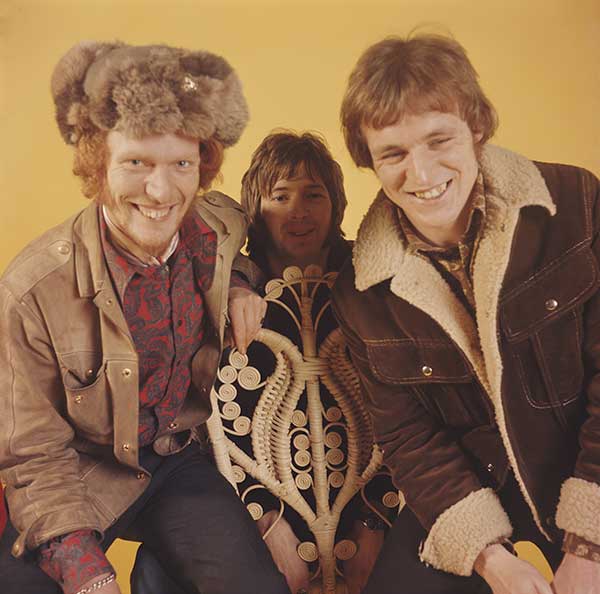
The world’s first supergroup, Cream existed for barely two years in the late 60s, and in their lifetime recorded just two full studio albums. But with their pioneering fusion of rock, blues and jazz, they directly influenced an entire generation of musicians – and therefore the course of rock music over the next decade.
Before late drummer Ginger Baker and bassist Jack Bruce, alongside guitarist Eric Clapton, formed Cream in 1966, most British pop music stuck pretty rigidly to a verse/chorus format, and any instrumental solo was generally confined to repeating the melody.
Cream changed all that. For example, they took the two-note riff that comprised Willie Dixon’s Spoonful and stretched it from two-and-a-half minutes to six-and-a-half, exaggerated it, and improvised all around it with a dazzling display of virtuoso playing. This wasn’t a new idea, but it was largely confined to jazz – a style that by the mid-60s, as Frank Zappa famously remarked, “wasn’t dead, it just smelled funny”.
The dynamic that propelled Cream hinged on Baker and Bruce’s jazz backgrounds and Clapton’s blues roots. Clapton may not have had the musical knowledge and technique that Baker and Bruce possessed, but he had a God-given gift that enabled the group to justify their audacious name.
Although Cream had already enjoyed UK chart success with their debut Fresh Cream, released in December 1966, the band had actually been together less than a year when they started recording seminal album Disraeli Gears, and had only just signed an American deal with Atlantic Records. Any idea that Cream were some kind of blues revivalists was dispelled by the forceful originality of the songwriting on Disraeli Gears and the many highly distinctive performances on a collection that has most surely stood the test of time.
On stage the chemistry within Cream was staggering. “It was as if something else had taken over,” said Baker in 2014. “You’re not conscious of playing. You’re listening to this fantastic sound that you’re a part of. And your part is just… happening. It was a gift, and we three had it in abundance.”
Clapton was more succinct. He called it “blues, ancient and modern”.
44. Motley Crue
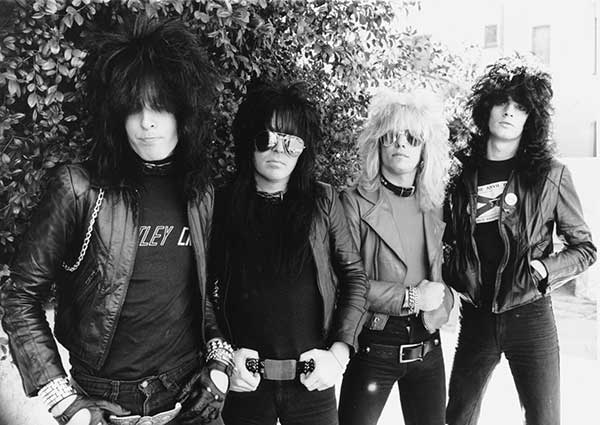
Perhaps it was their manager, Doc McGhee, who best summed up Mötley Crüe. Recalling the years when he handled the business affairs of these self-styled Bad Boys of Hollywood, McGhee stated in the Crüe’s autobiography, The Dirt: “I spent 10 years of my life apologising for that band. As their manager, that’s all I really did. Apologise.”
McGhee is no saint himself: in 1988 he received a suspended five-year prison sentence for drug-trafficking offences. But when this hard-nosed businessman who made a fortune managing Mötley Crüe declared: “There was nothing I liked about them,” it confirmed beyond all doubt their reputation as the most depraved rock’n’roll band of them all. Nobody, not even Ozzy, Zeppelin, Keith Moon or Guns N’ Roses, has wreaked havoc with such reckless abandon as Mötley Crüe.
Formed in Los Angeles in 1981, the Crüe – bassist Nikki Sixx, drummer Tommy Lee, guitarist Mick Mars and singer Vince Neil – were kings of the Hollywood hair metal scene and relished all the perks that came with that title. With an inexhaustible supply of booze and drugs, the Crüe partied so hard throughout the 80s it’s a miracle they all survived.
Sixx almost croaked twice, overdosing on heroin in London, where a dealer dumped his apparently lifeless body in a skip, and in LA, where he was resuscitated with adrenalin shots – inspiring the Crüe anthem Kickstart My Heart. In the end the sole casualty of the Crüe’s wild years was Hanoi Rocks drummer Nicholas ‘Razzle’ Dingley, who died in the passenger seat of Vince Neil’s sports car after the singer crashed it during a booze and drugs bender in 1984.
Incredibly, amid all the mayhem, Mötley Crüe became one of the biggest bands in the world, selling more than 50 million albums. Having cheated death and survived some lean years when Vince and then Tommy left the band, the Crüe are still in business – sort of. Following the movie adaptation of The Dirt in 2019, interest in the band has renewed itself once again. They had signed a touring cessation contract in 2015, which was meant to signal the end of the band, but – surprise, surprise – the agreement turned out to be less than watertight, and Crüe returned to the stage in 2022.
Then they fired Mick Mars and brought in John 5. What happens next is anyone's guess.
43. Rainbow
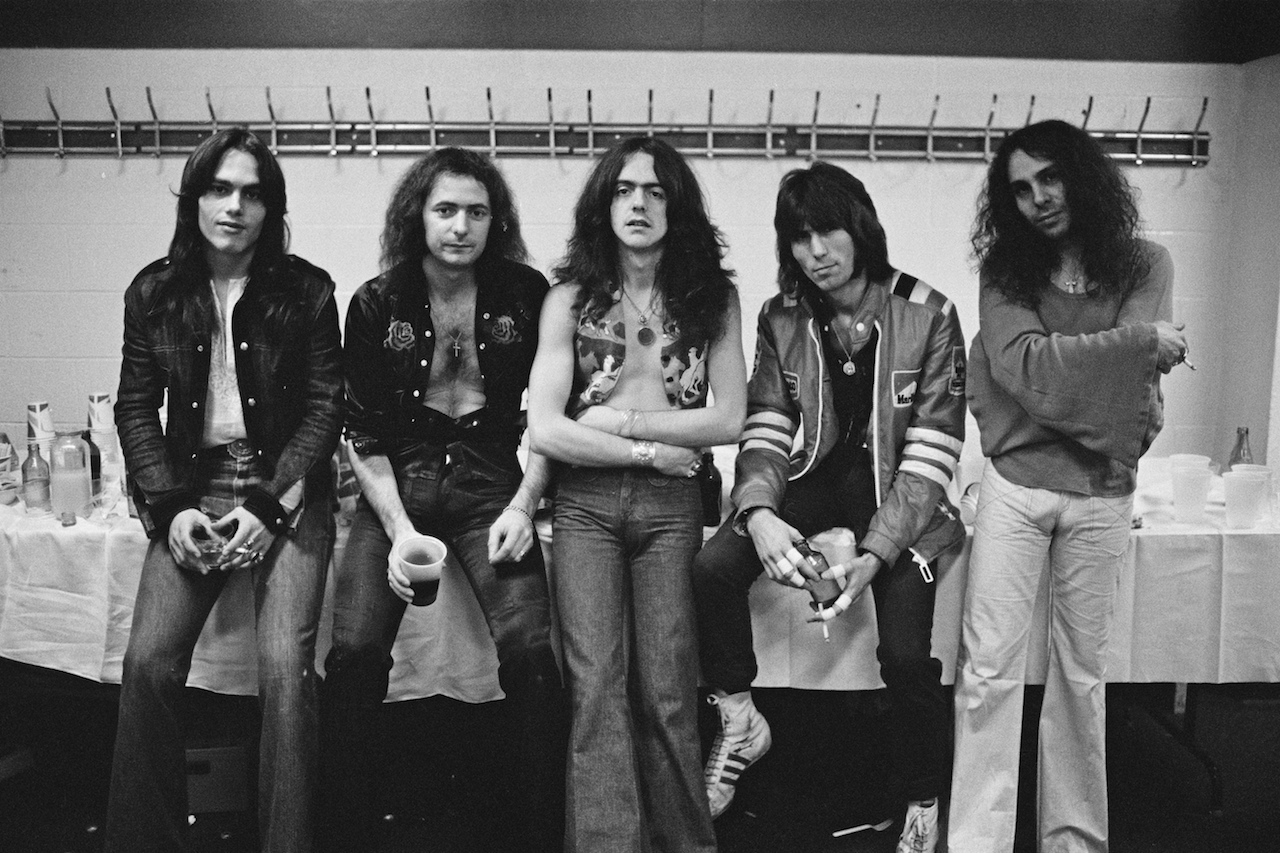
It was with Deep Purple that Ritchie Blackmore became legendary, but his legacy extends far beyond Purple. With Rainbow – the band he formed after quitting Purple in 1975 – he made nine studio albums, including such classics as Rising and Down To Earth.
Blackmore always played smart, and never more so than with his brilliant reinvention of Rainbow in the late 70s. Their second album, Rising, captured the band at their peak. Driven by the guitarist’s single-minded vision, it pioneered an epic sound whose influence can still be heard today. Rising had a power and grandiose quality perfectly illustrated by its cover art and Blackmore had retained only Ronnie James Dio in a new line-up featuring heavy-hitting drummer Cozy Powell.
But by fourth album Down To Earth three years later, Blackmore had decided that Dio’s demons-and-wizards shtick was passé, replacing him with Graham Bonnet, whose quiff and Hawaiian shirts didn’t sit well with Rainbow’s denim-and-leather demographic. However, he was ideally suited to the radio-friendly rock of Down To Earth.
With former Purple bassist Roger Glover joining the band and producing the album, Rainbow had Top 10 hits with Since You Been Gone and All Night Long, while Eyes Of The World maintained a link to the past.
The Lord Sugar of his day, Blackmore fired a lot of people from Rainbow. An exception was Bonnet, who quit when making the follow-up to Down To Earth. But Blackmore had the last laugh. With new singer Joe Lynn Turner, Rainbow had their biggest hit album and single with Difficult To Cure and I Surrender, both reaching No.3 in the UK.
Even by the standards of the 70s, the story of Rainbow is a tangle of creative genius, colourful characters and personal tensions. In the space of their time together, Blackmore assembled one of the greatest rock bands ever – and then dismantled it. More than once.
42. Pearl Jam
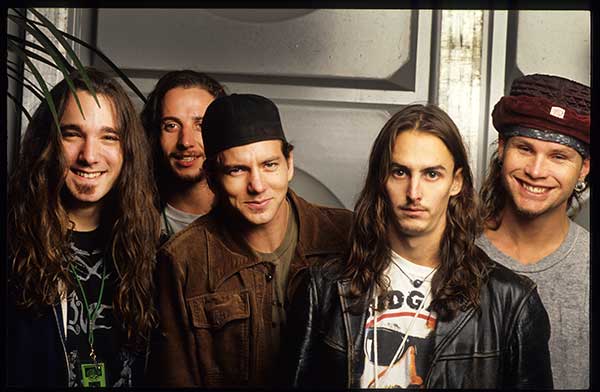
Pearl Jam are grunge’s great survivors. Unlike Nirvana, Soundgarden, Alice In Chains and the other major bands from the Seattle scene’s graduating class of 1991, they’ve never gone away, either permanently or temporarily. And while they’ve endured their share of traumas – not least the deaths of so many friends and contemporaries – they’ve ridden them out.
But then resilience is part of Pearl Jam’s DNA. They were born in tough circumstances: guitarist Stone Gossard and bassist Jeff Ament were previously members of Mother Love Bone, whose career had barely got out of the traps when singer Andrew Wood fatally OD’d.
They turned their grief into hope, channelling it into multimillion-selling debut album Ten, only to be disparaged by the gatekeepers of cool as grunge fifth columnists. Much of the scorn was directed at singer Eddie Vedder, the San Diego surf rat seen as an interloper in the insular north-west scene. His rich baritone and heart-on-sleeve sincerity sat at the opposite end of the spectrum to Kurt Cobain’s weaponised irony and punk-rock sneer.
The derision didn’t dent Pearl Jam’s rise – their second album, 1993’s Vs., sold nearly a million copies in its first week. But Vedder in particular hated their success. The band pushed back hard against it, refusing to make videos or be interviewed.
By late 90s the insanity was starting to fade and things had reverted to something approaching normality. Their record sales were a fraction of what they once were – 1998’s Yield sold a million copies compared, to Ten’s eventual 13 million – and you suspect no one was happier about that than Pearl Jam.
There were still hard times to endure, not least the tragedy of nine fans who were crushed to death during the band’s set at Denmark’s Roskilde festival in 2000. But for the most part their troubles were largely behind them.
Since the turn of the millennium, Pearl Jam have existed outside the mainstream music industry. These days much of the band’s potency comes from their devotional live shows rather than from the commercial impact of their albums, repositioning them as a kind of Gen-X Grateful Dead (they were one of the first bands to make recordings of their gigs available to fans as ‘official bootlegs’). But it underlines that Pearl Jam in 2024 are much the same as Pearl Jam in 1991: a band of the people, for the people.
41. Marillion
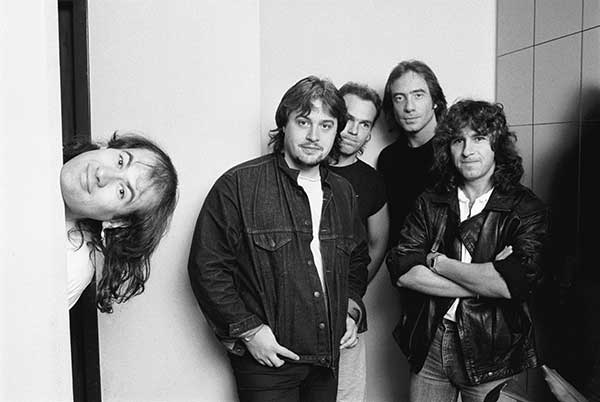
If progressive rock bands are supposed to be boring, nobody told Marillion. The making of their classic album Misplaced Childhood – in early 1985, at Berlin’s Hansa Studios – was effectively one almighty bender. Singer Fish led the debauchery, blowing his wages on sex workers, sampling heroin for the first (and last) time, stripping naked in a bar to win a bet, crashing a car in a race round the city, and throwing bricks over the Berlin Wall in an attempt to set off landmines.
Marillion might have been inspired by the music of Genesis and Yes, but they could party like Guns N’ Roses.
Formed in Aylesbury, Buckinghamshire in 1979, the band were originally named Silmarillion after a posthumously published work by JRR Tolkein. The name was shortened in 1981, the same year that charismatic Scotsman Fish (born Derek William Dick) joined the group. After signing to EMI the following year Marillion released four studio albums – all of them UK Top 10 hits – before Fish left for a solo career in 1988.
His replacement Steve Hogarth, formerly of The Europeans, this year celebrates 30 years as Marillion’s frontman. Yet Hogarth will always be considered ‘the new guy’, such was the impact of the music that Marillion made with Fish, especially Misplaced Childhood and its hit single Kayleigh, a song which had the singer credited for inventing an original name. As he once commented: “I’ve got used to signing autographs for 13-year-old Kayleighs.”
In the Fish era, Marillion were standard bearers for progressive rock, but with Hogarth the band have been progressive in the broadest sense. Their music has evolved far beyond those primary influences, and after being dropped by EMI in 1996 Marillion created a new, internet-based business model that saw them thrive as an independent cottage industry. Eight years before Radiohead sold In Rainbows exclusively online, Marillion financed their album marillion.com by inviting 30,000 fans on their database to pre-purchase the album before it was even recorded, inventing crowdfunding in the process.
It’s ironic that a band once derided for sounding like the dinosaurs of 70s rock should prove to be pioneers of the internet age. But this forward thinking secured Marillion’s future. In 2022 they released An Hour Before It's Dark, an album which suggested that, far from being dinosaurs, Marillion are taking prog directly into its future.
40. Status Quo
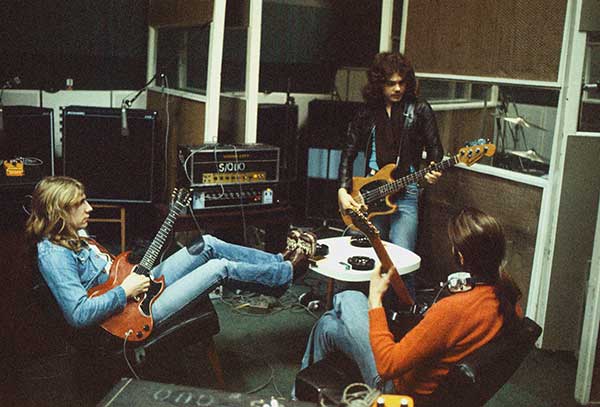
So who’s up for a bit of heads-down, legs-apart, no-nonsense, mindless boogie, then? As any fool knows, Status Quo aren’t just one of the most enduring and successful rock bands of all time – having notched up a gobsmacking 62 hit singles, more than 100 appearances on Top Of The Pops, and spent 418 weeks (seven and a half years) in the British singles chart – they also have one of the most expansive catalogues.
Leaving aside the multitude of compilations and live records that flood the market, Status Quo have some 33 official studio albums to their name, the most recent being 2019's Backbone.
Status Quo have so much to answer for. And, okay – we know what you’re thinking and you’re right, to a point. But we're not here to tell you about the end-of-the-pier, Grandma’s-favourite cuddly-rogues Quo. We're talking about the Frantic Four. The original, 1970’s Status Quo. Rossi. Parfitt. Lancaster. Coghlan. What a fucking heavy band.
Now, sure – after bassist Alan Lancaster and drummer John Coghlan jumped ship in the mid-80s, guitarist/vocalist Francis Rossi had little opposition within the band when it came to dabbling with more middle-of-the-road-flavoured material.
While the band hit an enviable run of form with the succession of near-flawless albums they released between 1970 (Ma Kelly’s Greasy Spoon) and, for the sake of argument, 1981 (purists consider Never Too Late to be the last ‘real’ Quo album), some of the material they churned out post-Live Aid reunion is woeful. But Quo at their best? Utterly untouchable in simplistic brilliance.
And anyway, Quo were re-energised by their Live Aid opening slot, and their creative drive never really waned. Sadly, Rick Parfitt passed away in 2016, but the band returned with a new line-up, a new album and a Lynyrd Skynyrd support slot in 2019, before finally calling it quits in 2024.
Fifty-six years after their first hit, Status Quo's legacy as one of the best bands to have strode the stage remained intact.
39. Uriah Heep
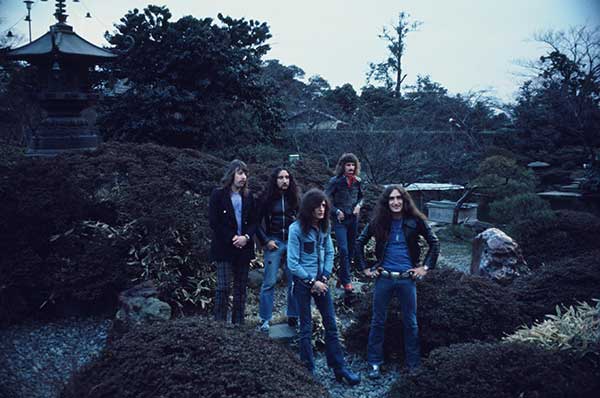
Since their formation back in 1969, Uriah Heep have never been hip. Though for all but a few of those years they have been incredibly popular – with the individuals who matter, at least.
Consistently reviled by the so-called tastemakers, Heep forged a reputation as a band of the people, daubing a double-disc concert release Live January 73 with the barbs of their critics (one of whom once chided with the utmost sarcasm: “Ken Hensley’s lyrics give some glimpse into why he’s highly regarded in foreign parts”) on the way to selling 30 million albums.
It wasn’t just the press, either. A run of successful releases that included Demons And Wizards and The Magician’s Birthday – both released in 1972 – generated the trappings of superstardom, but Heep’s fellow artists could be equally cruel. It speaks volumes of the band’s stature that in attempting to appoint a successor to David Byron, the vocalist they had sacked following the disastrous High And Mighty album, David Coverdale, Paul Rodgers and Ian Hunter all auditioned to join the band.
Unfortunately, the fact that each potential replacement declined when offered the position – Hunter claiming to have passed on a deal worth £5,000 a week; footballers’ wages back in 1976 – is equally revealing of Heep’s lack of street cred.
And yet, Uriah Heep have always had their niche. Performing hard rock with a progressive edge, they exerted a strong influence upon the genre we now know as heavy metal, but had the misfortune to follow in the footsteps of Led Zeppelin, Deep Purple and Black Sabbath.
“By the time that Heep came out, those bands were all established acts,” reflects guitarist Mick Box, the band’s last remaining original member. “The reaction was: ‘Oh, not another one’. I honestly don’t think that we ever recovered from that.”
However, at the time of writing, Uriah Heep are in something of a purple patch, enjoying a belated taste of acclaim from their peers, with a new generation of musicians, including Jon Schaffer of Iced Earth (whatever happened to him?) and Blind Guardian’s Hansi Kürsch – who formed a side project called Demons And Wizards – and Opeth’s Mikael Åkerfeldt, all nailing their colours to the mast. A farewell tour begins in 2025.
38. Chicago
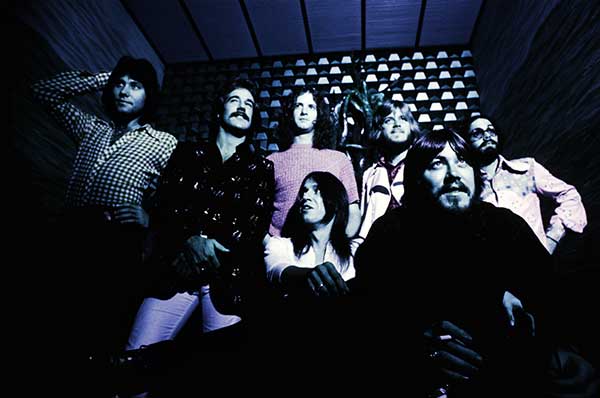
When they formed in their late 60s, Chicago's goal was to create a bold new fusion of classical, pop, good, old-fashioned R&B and jazz. The result was a daredevil mix they ended up dubbing "rock'n'roll with horns".
Whatever you call it, their sound made them one of the most successful rock bands in American history. They've made 26 albums, had 20 top 10 singles in the US – including three number ones – while 17 of their first 20 albums were certified Platinum by the RIAA.
But while their success is indisputable, with a band like Chicago, there's always a risk that it might be their darkest days which end up defining them. For Chicago, the very darkest day of all was January 23, 1978: the day that guitarist Terry Kath shot himself dead after a game of Russian roulette went horribly wrong.
Kath was just a week shy of his 32nd birthday when he accidentally killed himself. A singer, songwriter and wildly adventurous guitar player, Kath was the bedrock of Chicago, and he's still the greatest guitarist most people have never heard of.
Before Chicago’s sugar-coated 80s ballads – for which the band are arguably better known – there was the freewheeling Chicago of the late 60s and 70s, best sampled on A Hit By Varese, Dialogue (Parts 1 & 2) and the massive hit 25 Or 6 To 4. Back then, Chicago albums featured wailing horns, grooving Hammond organ and head-spinning time signatures, all harnessed by Kath’s howling lead guitar.
It took years for Chicago to properly get back on their feet after Kath passed away. Replacement guitarists came and went, line-ups shuffled around; plagued by their own addictions and troubles, members flittered in and out.
Ultimately, there are two Chicagos: the one with Terry Kath and the one without. The one without scored some huge hits in the 80s, including the Peter Cetera ballads Hard To Say I’m Sorry and You’re The Inspiration.
Even so, having suffered adversity and come out of it stronger, Chicago are still touring and making music. Their last album proper, Chicago XXXVIII: Born for This Moment, appeared in 2022.
37. Creedence Clearwater Revival
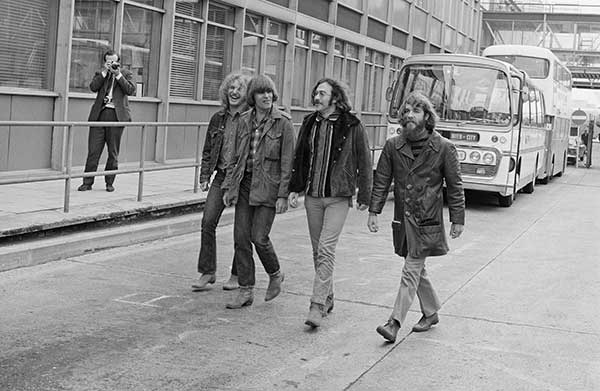
John Fogerty is a true American icon. As leader of Creedence Clearwater Revival in the late 60s and early 70s, he wrote and sang some of the all-time classic rock‘n’roll songs: Proud Mary, Bad Moon Rising, Travelin’ Band and Have You Ever Seen The Rain to name but a few, songs that Kurt Cobain and Krist Novoselic played in a Creedence covers band before they formed Nirvana.
But if there was one moment in time when the power of Fogerty’s songwriting was felt all around the world, it was on July 13, 1985, at precisely 12.02pm, when the mighty Status Quo kicked off Live Aid with a song Fogerty had written ten years earlier, one perfectly suited to this global music event: Rockin’ All Over The World.
In truth, Fogerty’s career didn’t get off to the best of starts. In the mid 60s, the band he’d formed with elder brother Tom in El Cerrito, California was working under a name that today beggars belief: The Golliwogs. At a time when new social values were emerging, not least the civil rights movement, The Golliwogs were doomed to failure. But when, in 1967, the band was renamed Creedence Clearwater Revival, everything changed.
As important as the new name was a shift in the group’s hierarchy that saw original frontman Tom cede power to John.
“I could sing,” Tom would later state, “but John had a sound.”
That sound would become one of the most powerful in American music. Backed by Tom on rhythm guitar, bassist Stu Cook and drummer Doug Clifford, John Fogerty blossomed as a singer, guitarist and songwriter of rare distinction. His sound was timeless, relevant to the new rock audience yet steeped in age-old Americana. Blending blues, folk, soul, country, rock ‘n’ roll and psychedelia, the music had a rootsy, backwoods aura that led rock critics of the day to brand it ‘swamp rock’.
Between 1968 and 1972, Creedence released seven albums and scored 12 top ten hits in the US and UK. But they split in ’72, and after Tom Fogerty’s death in 1990 there would be no reunion.
36. The Doors
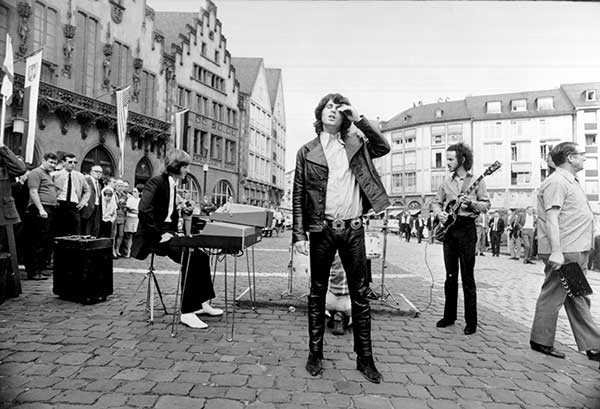
Some bands are defined by their eyebrow-raising characters as much as they are their music. The Doors are one such band.
Genius or not, Jim Morrison had never been what passed in the mid-20th century for a normal person. The eldest son of Rear Admiral George Morrison of the United States Navy, he grew up a well-educated but self-absorbed child who became a major disappointment to his father when, instead of following in the family footsteps and going to naval college, he plumped instead for a degree course in film studies in Los Angeles.
This was where he met the professorial Ray Manzarek, another parental disappointment who’d already tried his hand at forming a rock group with his brothers. In 1965, Morrison sang Manzarek the opening verse to the song that became Moonlight Drive, while tripping on the beach at Venice. Manzarek famously “saw dollar signs” as Morrison crooned him his as-yet musically unaccompanied verse. Morrison, famously, saw only stars. The rest, as they say, is history.
The band that they formed, The Doors, arrived just as rock was at its most fearsomely individualistic, before the rules of the road had been written. What followed was some of the most open-minded, virulently innovative music the era saw.
Fuelled by LSD and self-belief, their debut self-titled Doors album is now acclaimed as a cornerstone moment in the history of rock. If Sgt Pepper was the symbol of pop’s raising from gutter-level singsong to symphonic high art, eventually The Doors gave the lie to such positivism, drawing on the growing feeling of ‘us against them’ that pervaded a generation of young Americans in fear of the draft to Vietnam, or in protest against what they saw as the overarching dead hand of a society where long hair was now a symbol of angry defiance.
But it was also around this time that Jim Morrison, college dropout and hippy Hollywood maverick, began his transformation into the Lizard King – the alternate, take-no-prisoners, no-one-here-gets-out-alive rock-consciousness that would ultimately both build his legend and deprive him of his senses. His ultimate downfall wasn't far behind.
More than 50 years on, there's still never been anyone else quite like The Doors.
35. Lynyrd Skynyrd
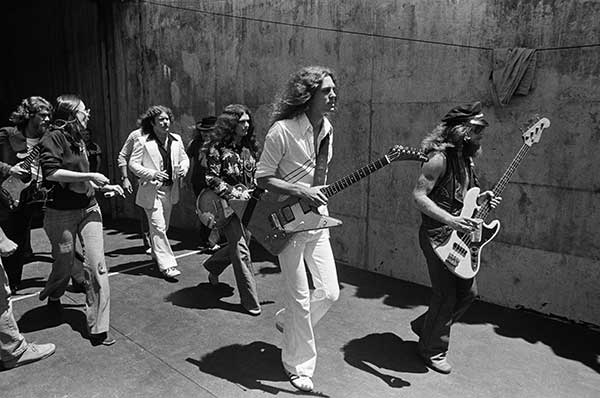
No band has been cut down in their prime so suddenly, and so horrifically, as Lynyrd Skynyrd. Having risen from humble origins in Jacksonville, Florida, Skynyrd had become major stars by the mid-70s. Their name a joke on their despised former schoolteacher Leonard Skinner, the band popularised the soulful sound of southern rock with anthems such as Sweet Home Alabama and Free Bird. Then, on October 20, 1977, during a US tour, the band’s chartered plane crashed near Gillsburg, Mississippi.
Six people were killed, including singer Ronnie Van Zant and guitarist Steve Gaines.
In the aftermath of this tragedy, four of the survivors – guitarists Gary Rossington and Allen Collins, bassist Leon Wilkeson and keyboard player Billy Powell – regrouped in the Rossington Collins Band.
Then in 1987, the previously unthinkable happened. Ten years after the plane crash, a new version of Skynyrd was formed, with Ronnie Van Zant’s younger brother Johnny as the singer alongside Rossington, Wilkeson and Powell, with returning guitarist Ed King replacing Collins, who had been paralysed in a car crash in 1986.
Now, three decades since that unlikely comeback, Lynyrd Skynyrd are still rocking. Collins, Wilkeson and Powell have all since died, but Rossington and Johnny Van Zant continue to lead the band, along with guitarist Rickey Medlocke, who was Skynyrd’s drummer in the early 70s. Skynyrd were not the originators of southern rock – before them, the Allman Brothers Band blazed the trail – but it was Skynyrd’s blend of southern soul and hard rock that defined the genre.
And their influence has been far-reaching: Metallica have covered their ballad Tuesday’s Gone, and Guns N’ Roses referenced Skynyrd when they recorded Sweet Child O’ Mine. Axl Rose stated: “I got some old Skynyrd tapes to make sure that we’d got that heartfelt feeling.”
That depth of feeling – in the music, and in the words of Ronnie Van Zant – is what made Lynyrd Skynyrd one of the great American rock’n’roll bands. And it’s still true today. Skynyrd’s 2012 album was pointedly titled Last Of A Dyin’ Breed, and Gary Rossington proudly proclaimed: “While I’m still alive, I just want to keep the band going, keep the Skynyrd name going, and to let people hear this music." In the end, even his passing in 2023 didn't change that: A month later, the band announced they would continue with no original members.
34. Slade
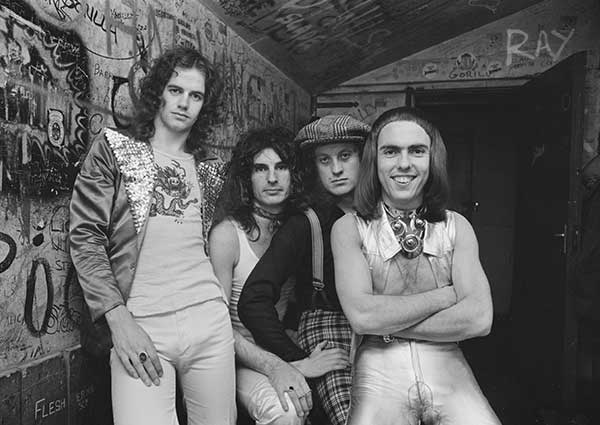
An impressive run of hits conspired to turn Slade into a national treasure, but their heritage as a rock band remains sorely under-explored. Noddy Holder and company notched up no less than 23 UK Top 20 singles during the 70s and 80s, six of which reached No.1. But many of the Midland-based band’s most rewarding moments are tucked away on an extensive album catalogue.
Mentored by former Animals bassist and Jimi Hendrix manager/producer Chas Chandler, singer/guitarist Noddy Holder, ‘superyob’ guitarist Dave Hill, bassist Jim Lea and drummer Don Powell burst out of the glam-rock era and ended up giving plenty of work to the compilers of the Guinness Book Of Hit Singles.
Later, after the Top Of The Pops appearances dried up, Slade stubbornly refused to follow suit, and took root in the university circuit. Then came their miraculous, near-legendary comeback at the Reading festival in 1980.
“Honestly, it felt as though we had no competition,” Lea told Classic Rock. “On our day, like at Reading, we knew that we were unbeatable.”
Granted an unlikely reprieve – the band were approaching bankruptcy – Slade’s second wind lasted six further albums and the additional, better-spelled hits My Oh My, Run Runaway and All Join Hands.
In the mid-80s Holder walked away from Slade in order to pursue a career in broadcasting and acting, though the band didn’t dissolve formally until 1992. A version of the band, not including Holder, reformed later the same year, under the name Slade II and continue to play live – though have since reverted back to simply using the name Slade.
Holder, awarded an MBE in 2000 for his services to music, and voted No.47 in Classic Rock's list of 100 all-time great rock frontmen five years later, continues to resist all reunion proposals.
33. Bruce Springsteen
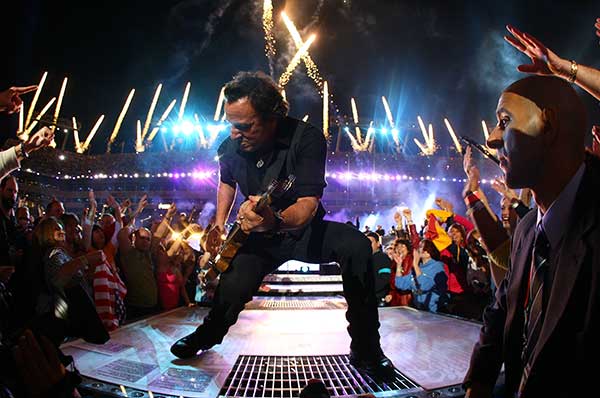
Raised in the blue-collar town of Freehold, New Jersey, Bruce Springsteen was the eldest of three children born to father Douglas, a World War Two veteran and sometime bus driver and prison guard, and mother Adele, a legal secretary.
Their only son, he grew up something of a loner, often at odds with his buttoned-up father and almost everyone else he came into contact with. Music lit him up like nothing else. His first band was a bunch of high-school Beatles wannabes called The Castilles, whose drummer went off to fight in Vietnam and didn’t come back.
Springsteen skipped the draft, dropped out of college and passed through a bunch of other short-lived bands before striking out on his own. He was signed to Columbia Records in 1972 by John Hammond, and became the latest in a string of earnest young singer-songwriters to be touted as the ‘new Bob Dylan’. His first two albums for the label were overly intricate, verbose affairs and both flopped, but then he hit pay dirt with his third, in 1975.
On Born To Run, Springsteen was able to imagine what Roy Orbison might have sounded like fronting Phil Spector’s Wall Of Sound. Propelled by its title track, it achieved platinum sales in the US. Springsteen had arrived; the irreversible imprint he would have on modern American rock well underway.
Part of Springsteen's enduring appeal is that he isn’t an overtly political songwriter, but almost every song the he has written is, to some extent, political.
That’s because the New Jersey native has spent most of his musical career documenting the daily struggle of characters who exist in an America where the status quo is enforced by a corpocratic government that allows only the rich to get richer. That’s something Springsteen certainly ramped up during, and in the wake of, Ronald Reagan’s presidency and the still-lingering effects of Reaganomics – brought up in a working class family, he has always empathised with blue collar workers, even if some of them, somewhat ironically, don’t actually share his liberal political views.
What makes him – as evidenced by his inclusion here – so universally relatable as a songwriter is that if the settings and landscapes of his songs are inherently political, Springsteen’s message isn’t always. Rather, his lyrics are more subtle commentaries that allow the listener – if they want – to discern their own meaning and message.
Bobby Jean, for example, is a beautiful ode to friendship, but in the context of the album it’s on – Born In The USA – it exists in a world ravaged by the long-term effects of war and economic instability. Same with The River, Point Blank, Racing In The Street, No Surrender, even Born To Run – all can be listened to (and sung along with) on their own terms, devoid of their socio-political context, but to do so is to strip them of a critical part of their essence.
There are some songs, however, where Springsteen confronts those forces head on, tackling the powers that be with an unflinching eye and a heart hungry for social justice, equality and a desire to redress a balance that’s been tilted in favour of the privileged for far too long. That's what makes him a voice that resonates with so many.
32. Tool
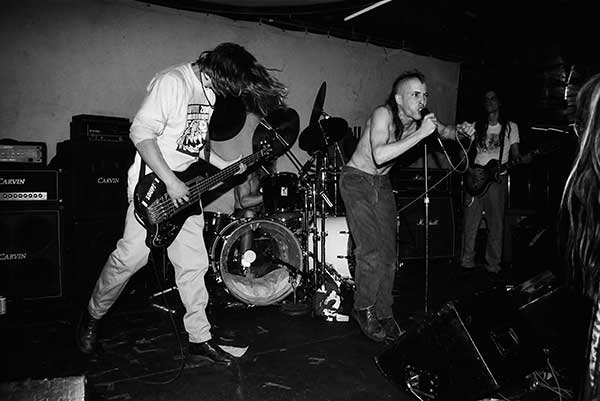
Put simply, Tool have made some of the greatest music of any genre ever created in the long history of popular music. It might seem like a bold claim, but when it comes to the worlds they operate in, they are truly singular.
In the quarter of a century that they’ve been a band, it’s also arguable that no other group have attracted quite as much obsessive attention from fans. The alt.metal band that came from the vibrant LA scene of the early 90s have transcended to one of music’s most intriguing cults.
Loosely formed in the late 80s, it wasn’t long before Tool had a handful of solid songs, which they eventually split between 1992’s Opiate and 1993’s Undertow. While Tool became more psychedelic and lyrically profound in the late 90s, they were initially motivated by being broke, living in a smoggy, overcrowded city, hating their neighbours and other pet peeves.
If there is anything outside of their music that makes Tool an absolute law unto themselves then it has to be the visuals that accompany the band. In the live environment they become as much a part of the show as the band. But it’s the videos from the mind of Adam Jones, videos that don’t even feature the band, that even the most casual music fan can be sucked into Tool’s world by. The promo films of Stinkfist and Schism are now almost synonymous with the music they compliment.
For a band as unique and unclassifiable as Tool, their commercial success is quite an incredible achievement. Aenima debuted at number 2 on the Billboard 200 upon its release, and the band went one better with both Lateralus in 2001 and 10,000 Days in 2006. In fact 10,000 Days managed to shift over half a million copies, twice as much as second placed Pearl Jam, in its first week alone. Latest album Fear Inoculum hit the summit of six charts across the globe.
Ah, yes – Fear Inoculum. Has any album in the history of rock music ever been as mystifying and mythical? Thirteen years the world waited for the fifth Tool album, and, rather than fatigue setting in, the anticipation levels seemed to grow and grow every year. This fevered dedication from fans, plus their sky-high levels of creativity, have ensured their place as one of the world's greatest rock bands. Bring on the sixth.
31. Fleetwood Mac
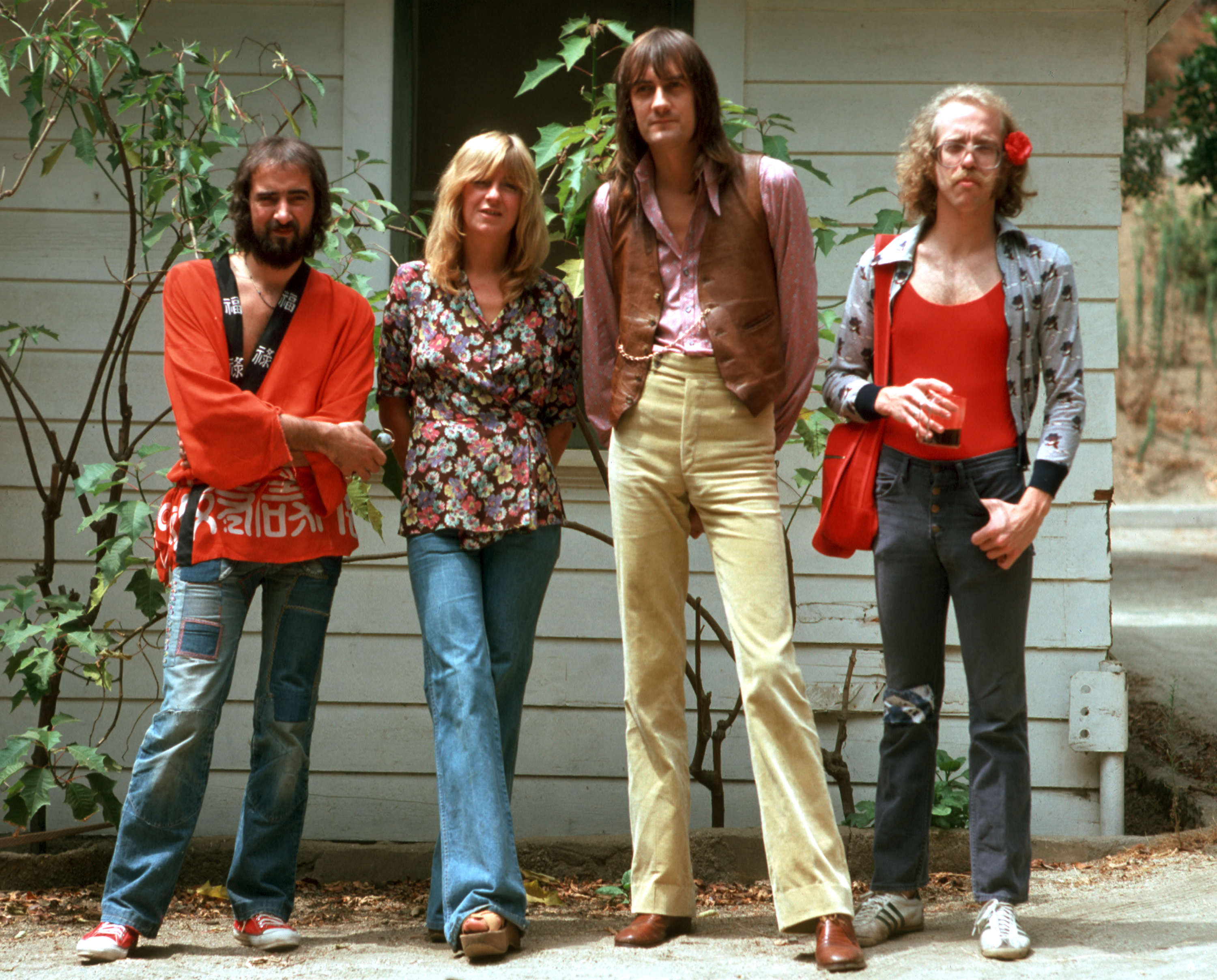
Few rock’n’roll stories are as downright weird as the strange tale of Fleetwood Mac: a 50-plus-year saga involving drug-induced madness, bitter in-fighting, a ‘fake’ band that stole their name, a bizarre on-tour disappearance, two broken marriages, at least one ruinous coke habit and the kind of bed-hopping normally seen in an old-fashioned West End farce. Oh, and also involving some of the best rock music of the 60s, 70s, 80s and beyond.
Fleetwood Mac formed in London in 1967 at the height of the British blues-rock explosion. The band was named after drummer Mick Fleetwood and bassist John McVie – partly as a ploy to persuade the latter to join – but the real star of the original band was guitarist/vocalist Peter Green. Green was so good that he’d been picked to replace Eric Clapton in John Mayall’s Bluesbreakers (where he was later joined, albeit briefly, by Fleetwood and McVie), and his innovative style would inspire future generations of rock guitarists, from Tony Iommi and Gary Moore to Noel Gallagher.
Green quit the band in May 1970, his mental health damaged by drug use. A second guitarist, Jeremy Spencer, also afflicted by drug-related trauma, vanished 10 months later in the middle of a US tour, after saying he was popping out to get a magazine. He later resurfaced as a member of American religious cult The Children Of God. And a third guitarist, Danny Kirwan, was admitted to a psychiatric hospital after being fired in 1972. A fourth, Bob Weston, was also fired after he had an affair with Fleetwood’s wife.
In the early 70s, Fleetwood Mac were in disarray. But in 1975 everything changed. Having relocated to Los Angeles, Fleetwood, McVie and his wife Christine (née Perfect, a singer and keyboard player who’d joined the band in 1970) brought in a new Californian guitarist, Lindsey Buckingham, plus his girlfriend, singer Stevie Nicks. Within two years, Fleetwood Mac were one of the biggest groups in the world, their new sound (far removed from the blues rock of old) defined by 1977’s blockbuster Rumours, the archetypal Californian soft-rock album.
Over 50 years and more than 100 million album sales later, Fleetwood Mac are still going strong – sort of. While Buckingham departed the band for the second time in 2018, under a suitably dramatic cloud of cross-words and lawsuits, the remaining members just wrapped up a lengthy tour. After 17 studio albums and 15 different line-ups – in which, aptly enough, Fleetwood and McVie have been the only constants – it's likely that the death of Christine McVie in 2022 has ended one of rock's great soap operas.
30. Nirvana
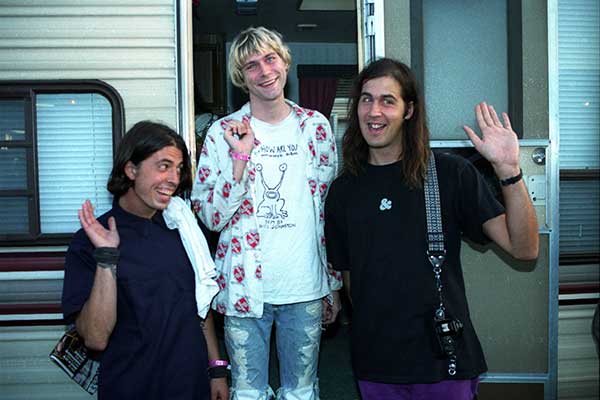
In September 1991, three socially-awkward slacker kids from Seattle changed the world.
It’s genuinely difficult to overstate the impact Nirvana had – not just on music, but on popular culture as a whole – when their second album, Nevermind, dropped in the autumn of that year. Not since a certain Liverpudlian quartet had a phenomenon torn through the mainstream with such power – that bandleader Kurt Cobain had formed Nirvana with the idea of “mixing really heavy Black Sabbath with The Beatles” is no coincidence.
Flanked by Krist Novoselic on bass and Dave Grohl on drums (original drummer Chad Channing left after recording their debut album), Nirvana released three studio albums in their seven years together (1989’s Bleach, 1991’s Nevermind, 1993’s In Utero). Along with their MTV Unplugged live album and ‘92 B-sides compilation Incesticide, Nirvana created some of alternative music’s most fundamental touchstones. With the help of their quiet-loud template – which Cobain famously admitted to stealing from The Pixies – they made good on the promise that all you need is three chords and the truth, distilling disaffected teenage angst into art, and influencing everyone from Weezer to Tori Amos and Take That.
“I think Kurt was a great songwriter, because it’s not easy to take something simple and make it sound interesting,” Chad Channing told us in 2016. “If you can put together a song that has three or four chord changes in it and keep people interested, that’s a trick.
"It’s a trick to make things simple sound good. And one of his best qualities was his writing. Not just musically, but vocally; he had great vocal melody ideas. And that to me is key, in any good songwriting. You can have a really cool-sounding song, but you also need a really good vocal melody. He was really good at coming up with that sort of stuff in Nirvana.”
Of course, it all came to a tragic, premature end on April 5 1994, when it was announced that Cobain had died by suicide at his home in Seattle. Grohl eventually went on to form Foo Fighters, taking the nascent creativity he'd shown in his time with Nirvana and realising it to its full, arena-filling potential.
29. Judas Priest
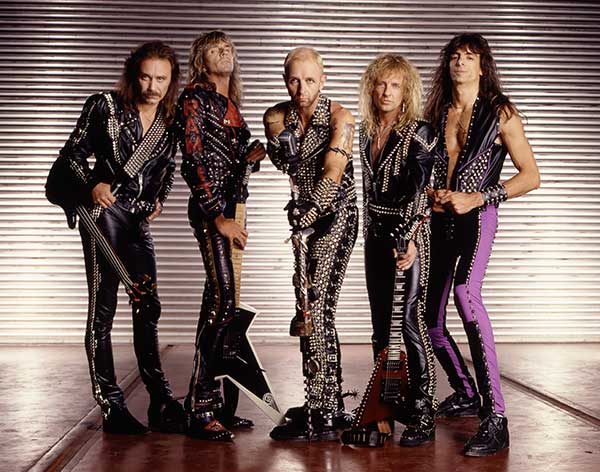
Black Sabbath came first. Iron Maiden and Metallica are bigger. But if there is one band, above all others, that defines the sound and aesthetic of heavy metal, it is Judas Priest.
“Metal is a very special kind of music,” says the band’s singer Rob Halford. And what this band has represented, for more than 40 years, is metal in its purest form: the screaming lead vocals, the duelling guitarists, the bludgeoning riffs, the leather and studs, the songs about death and destruction and motorcycles and, yes, heavy metal itself. This singular vision and missionary zeal was proclaimed in the title of Priest’s 1984 album Defenders Of The Faith.
It was in 1969 that the original Judas Priest (named after the Bob Dylan song The Ballad Of Frankie Lee And Judas Priest), a blues-rock band led by singer Al Atkins, was formed in Birmingham. In 1970 a new line-up included guitarist Kenny ‘KK’ Downing and bassist Ian Hill. But it was after Atkins departed in 1973 that the real Judas Priest was born, with Halford their dynamic singer and second guitarist Glenn Tipton increasing their firepower.
Inspired by heavy rock pioneers such as Sabbath, Led Zeppelin, Deep Purple and Cream, the young Priest recorded their debut album, Rocka Rolla, in 1974. But it was two years later, with Sad Wings Of Destiny, that the band found their signature sound.
In the 1980s Priest became one of the biggest metal bands in the world, with hit albums including British Steel and Screaming For Vengeance. In the 90s there were darker days: first, when a lawsuit was filed against the band following the deaths of two young fans from Nevada in a suicide pact allegedly inspired by Priest’s music; then when Halford quit to form a new band, Fight, and was replaced by Ohio-born singer Tim ‘Ripper’ Owens, poached from a Priest tribute act.
But in 2003 Halford returned to his rightful place as Priest’s master of ceremonies. And although Downing retired in 2011, the band have continued with Londoner Richie Faulkner as Tipton’s foil on the defiantly old-school 2014 album Redeemer Of Souls and the sudden, late-career hot-streak of 2018's Firepower and 2024's Invincible Shield.
In 2015 Halford told Classic Rock: “I’ve always been very happy that I’m a singer in a metal band. It’s wonderful.” And Priest are not just any heavy metal band, they’re the most ‘heavy metal’ heavy metal band of them all.
28. Genesis
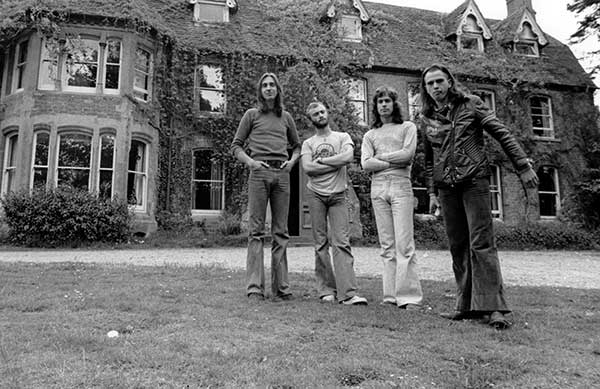
‘Peter Gabriel – good, Phil Collins – bad’ (or indeed vice versa) is a common sub-text in discussions between Genesis fans.
That split view of Genesis’ music over the years is based mostly on the assumption that during each of those two frontmen’s respective eras with the band, Genesis’ music was rigidly delineated musically and/or that the frontmen were always the chief architects of the band’s music at the time.
But it’s a flawed premise that such an argument is based on. At all stages of the band’s career, all the members of Genesis contributed to the songwriting and arrangements, and the shift from Gabriel-led epics to Collins-fronted pop was neither instant nor as obvious as is often made out.
Although Genesis came to epitomise the sound and character of British progressive rock – far more so than the deliberately abstruse eclecticism of King Crimson or the pastorally inclined, cod-mysticism of Yes – it’s worth recalling that that perception actually outlived for some considerable time Gabriel’s departure in 1975, and that their first real singles chart success was not some Collins-fronted 80s blockbuster but the typically quirky Gabriel-esque I Know What I Like (In Your Wardrobe)... in ’74.
It can’t be denied, however, that Genesis’s music went through distinct stylistic shifts during the 70s and 80s. In crude terms, Mellotron-driven, flute-augmented, odd- time fantasy work-outs gave way to shorter, stripped-down, American soul-influenced pop songs with big drum sounds; in concert, English music-hall-meets-70s-art-school theatrics were replaced by mountains of equipment, banks of lights and lasers, and Collins’ barrow-boy bonhomie and frenzied tambourine routines.
Ever oblivious to contemporary trends in music, Genesis seemed untouched by punk, new wave, heavy metal and, in later years, Brit-pop and grunge. Ploughing a determinedly singular furrow, Genesis weathered the vagaries of popular culture, critical scorn, the loss of two major members a decade earlier and on-going solo careers, and by the early 90s were shifting records in the multimillions, yet their main protagonists seemed to be losing some enthusiasm for the project.
Although Genesis limped on to one final studio album in 1997 – and a final tour, The Last Domino?, in 2021-22 – it was Collins’ departure in ’94 that ultimately sealed the band’s fate. Uniquely, they left a dual legacy, as both one of the most original British rock bands ever, and also as pop giants extraordinaire.
27. Motorhead
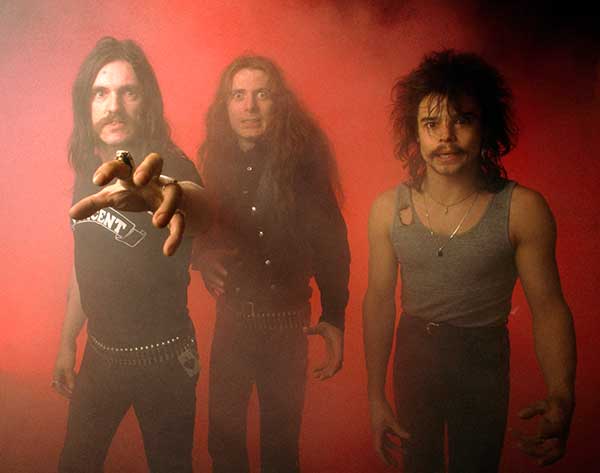
In the beginning, there was a bassist thrown out of space rockers Hawkwind because he enjoyed too many trips into orbit. After his dismissal from the group, following a drug bust on the Canadian border, the beleaguered bassist formed Motorhead in the summer of 1975, and the myth and legend of Ian ‘Lemmy’ Kilmister was born.
As with Ozzy a few years later – after he was ejected from Black Sabbath – many believed that Lemmy wouldn’t have much of a career away from the mothership. But they were wrong.
Aided by guitarist Larry Wallis (a one-time Pink Fairy) and drummer Lucas Fox, Lemmy formed Bastard, then quickly changed the name to the drug-inspired Motorhead (slang for speed-freak). Both the band and their sound were so dirty and nasty that Lemmy once proclaimed: “If we moved in next-door your lawn would die.”
Motorhead were rock’n’roll, but like nothing anyone had heard before. By the time Lemmy was joined by guitarist ‘Fast’ Eddie Clarke and drummer Phil ‘Philthy’ Taylor, the trio were so high on speed (in more than one sense) that they left even the sharpest of the punks puking in their wake. They appealed to anyone who enjoyed hearing riffs being torn apart by a band who were thrash long before anyone had thought of that term in a musical aspect.
They were rock’n’roll lifers, guys who found salvation in The Beatles and the hum of a Marshall amp. In a world where there was nothing to believe in – religion was a crutch, the church was full of hypocrites, government was a total shit show (we were and are led literally by the worst of us), and all honest hard work had to offer was a lifetime of back-breaking graft to line the pockets of the bosses – Motorhead were a colossal FUCKTHATFORAGAMEOFSOLDIERS.
They resonated because they weren’t faking it. They were uncompromising, fearless and full of piss and vinegar (well, cider and sulphate). A star like David Bowie – with his background in mime and his many image changes – seemed like he’d come from another planet. Motorhead, meanwhile, were like the guys you went to school with: piss-takers and trouble-makers. Beer drinkers and hellraisers. They were born to lose, but they lived to win.
Lemmy carried on making music with Motorhead, flanked by Phil Campbell and Mikkey Dee, until his death in 2015. Now, all three members of the classic line-up have sadly departed, but the band's legacy will live on forever.
26. Foo Fighters
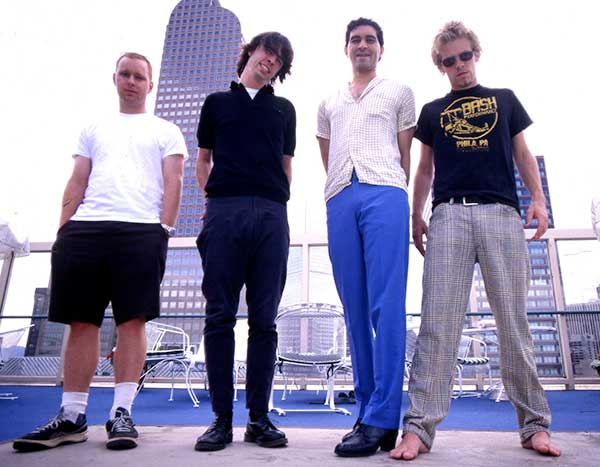
It reads like a poorly pitched film script – the kind studios would scoff at, and that a wary public would skip at the multiplex if it should somehow ever get made. It goes like this: one of the world’s biggest and most influential bands ends in a horribly violent suicide. Drummer emerges from the wreckage. He can both sing and play guitar. He releases an acclaimed debut under the guise of the Foo Fighters and before long, to all intents and purposes, takes over the world. Yes, it does sound ludicrous. But it happened.
How do you pick yourself back up again when your world is thrown into utter turmoil? The answer is that you just sort of have to. “After Nirvana, I wasn’t really sure what to do,” Grohl told Rhythm magazine in 2005. "I was asked to join a couple of other bands as the drummer, but I just couldn’t imagine doing that because it would just remind me of being in Nirvana; every time I sat down at a drum set, I would think of that."
So, instead, Grohl – also a talented vocalist and guitarist – threw himself into creating simply for himself, and a reluctant frontman and band leader emerged. Soon, he was fronting one of the world's most successful modern rock bands. Nine albums in, the band still continue to pack out arenas across the globe by staying true to the roots and ethos that saw them conquer the world in the first place.
Unlike so many of his peers, Grohl wears his artistic heart on his sleeve. The Foo Fighters’ early videos gave a nod to the celluloid excesses that bands like Roth-era Van Halen pioneered: ham theatrics, strained plot lines, a lot of dressing-up. Their more recent work has seen them dabble in bold experimentation – after touring the US' Sonic Highways in search for some rock'n'roll magic, 2017's Concrete And Gold emerged as a statement piece sent to warn us about the world's increasingly precarious political situation, while 2021's Medicine At Midnight was an album to dance to.
The tragic death of drummer Taylor Hawkins in 2022 threatened to call a halt to proceedings, but his tribute shows were a true celebration, and the band returned with But Here We Are in 2023. An enduring icon of rocking through the hard times, we need the Foos now more than ever.
25. U2
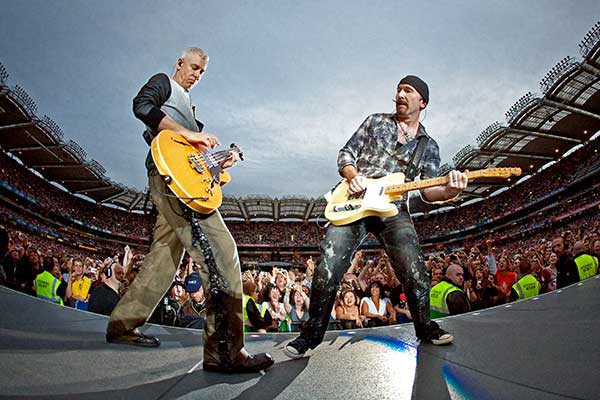
An unusually divisive band, not least in the rock community, for every dyed-in-the-wool U2 megafan there are also those for whom Bono’s posturings and weighty themes will always stick in the craw and infuriate. Let's not even talk about that time he was made Glamour Magazine's woman of the year. Or that unfortunate iTunes incident.
But whatever you think of the characters involved in the band – and, for what it's worth, we hear The Edge is an amiable enough chap – to deny the music, or the impact their music has had on the rock landscape over the years, would be nothing short of churlish. Everyone from prog stars to indie kids have heralded U2's finest moments as monumental to their own sound.
Plus, Bono's never been one to shy away from topics other similar-sized acts would run a mile from (religion, politics), so he deserves a bit of credit for that. Constantly shifting and evolving, whatever your view, there’s no doubting a vast body of work of planet-sized proportions.
Musically they've had it all. Starting off life as a punky, rough and ready kind of rabble, the career-defining The Joshua Tree completely turned that on its head, transforming them, seemingly overnight, into a cinematic stadium band. They became a band of slow-burn builds and climactic wig-outs, string arrangements, Beatles-esque chamber flourishes and glorious stretched outros.
At their best – such as on The Unforgettable Fire, or the aforementioned Joshua Tree – they were textured, incredibly layered yet still propulsive, the addition of a soupcon of swing, dramatic 80s synth stabs and sweeping strings highlighted an eagerness to explore territories previously off-piste.
All that said, if you're not convinced by now, you probably never will be. But let it be said, you're missing out – and their placing on this list suggests more people agree with us than you might think.
24. Bon Jovi
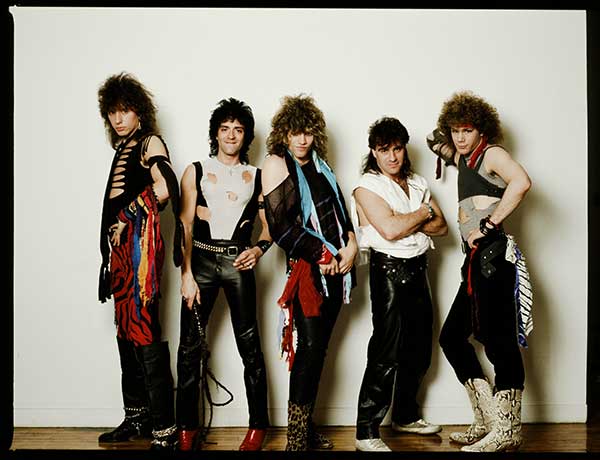
Rock'n'roll bands don't come much bigger than Bon Jovi. In a career spanning 40 years, they have sold 130 million albums and played to an estimated 34 million fans in more than 2,700 shows.
At the heart of this classically all-American success story is the man born John Francis Bongiovi, Jr, in Sayreville, New Jersey in 1962. Blessed with movie-star good looks and driven by a ferocious work ethic and an unshakable will to succeed, he was the kid who had the Superman logo tattooed on his arm and believed it. And after renaming himself Jon Bon Jovi – less “ethnic”, more “rock star” – he found the path to glory.
Having served a lengthy apprenticeship in various bar bands and working at his cousin Tony Bongiovi’s recording studio, The Power Station, Jon got his first break in 1982 when his song Runaway became a radio hit in the Jersey area. A contract with the Mercury label followed, and a band was formed under the name of Johnny Electric, hastily changed to Bon Jovi.
The band’s original guitarist was Dave ‘Snake’ Sabo, a childhood buddy of Jon’s who went on to form Skid Row. But in 1983 Jon settled on the line-up with which he would conquer the world: guitarist Richie Sambora, keyboard player David Bryan, bassist Alec John Such and drummer Tico ‘The Hit Man’ Torres.
It was in 1986, with their third album, Slippery When Wet, that Bon Jovi became one of the biggest bands in the world, and Jon Bon Jovi, with his fluffy hair and million-dollar smile, was transformed into rock’s leading sex symbol. The follow-up album, 1988’s New Jersey, was another multi-million seller. But arguably, Bon Jovi’s greatest success has been their longevity.
While many big 80s acts were killed by grunge, Bon Jovi rode out the storm with 1992’s Keep The Faith. More than 30 years on, they’re still doing the business, sounding revitalised on 16th album Forever, released in 2024. But it was in the 80s that Bon Jovi were at their big-haired, hard-rocking best, when Jon sang without a trace of irony or embarrassment: “I’ve seen a million faces, and I’ve rocked them all!” How we loved him for it.
23. David Bowie
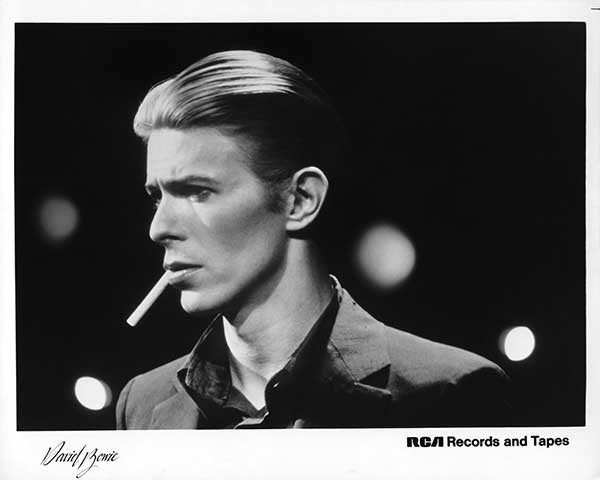
The music press obviously does’t know much about lizards. If they did, perhaps they wouldn’t have spent five decades referring to David Bowie as the ‘chameleon of pop’.
The defining characteristic of the chameleon, surely, is its ability to change colour to match its surroundings. It blends in with what already exists, rather than being different.
The reverse was true of David Bowie. After the release of his first batch of singles in 1966, Bowie forced the background to blend in with him. Then, when it did, he shed his musical skin and strode out in search of fresh inspiration. We watched Bowie do this countless times, right up until the releases of Blackstar in 2016, which he recorded with longtime producer Tony Visconti and a troupe of previously unheralded New York jazzers. Whichever way he turned, he never failed to prompt excitement and respect.
When contemporary rock bands talk about experimentation, it generally means that they’ve learnt a new chord. Bowie’s interpretation of the word was rather more extreme. When he reinvented himself, little remained of what went before. The musical direction might have gone from glam to Philly soul; the production might have traded sumptuous for brittle; the Bowie persona might have leapt from androgynous spaceman (aka Ziggy Stardust) to a Nazi-obsessed cabaret act (aka The Thin White Duke); even Bowie’s personnel – always a vital strand of each new era – were built on shifting sands, as the artist sought out the best foils to his dilettante muse.
Bowie’s appetite for reinvention made him both magnetic and inconsistent. He left genres and collaborators behind just as it seemed they were hitting their stride. Sometimes, he loitered longer than necessary in such questionable waters as electronica and dance. At times his eclecticism seemed contrived – and during his final quarter century there’s little doubt that he missed the target more than he hit.
And yet, as he proved with 2002’s excellent Heathen, with 2013's The Next Day and with Blackstar, you wrote off David Bowie at your peril. While most bands embraced familiarity, he remained one of the few established artists still capable of shocking and innovating; perhaps the only 70s' superstar who still pushed himself. Right until the end.
22. Thin Lizzy
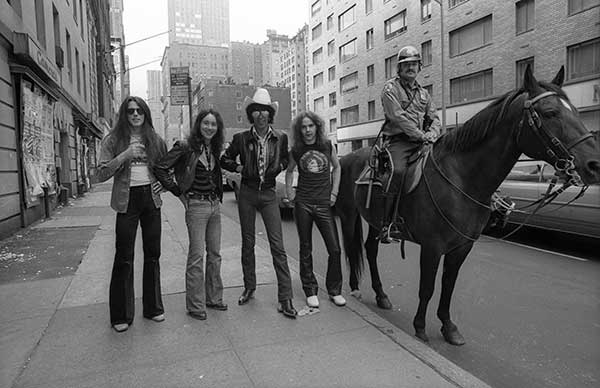
Thin Lizzy – named, like all great rock’n’roll bands, after a big, shiny car – sparked to life in 1970 as a trio of Dublin freakniks who played a Mulligan’s stew of traditional Irish folk mixed with bluesy rock’n’roll.
Led by the charismatic Phillip Lynott, a rare black Irishman with a wild, Hendrixy afro and a mischievous glint in his eye, the young, scruffy group struggled to find their way until they discovered the simple pleasures of searing hard rock, soaring twin-guitar harmonies, mirrored basses and impish moustaches.
By the mid 1970s, the world had caught on, and the little band from Dublin became one of the best-known, and beloved, arena rock bands of all time. But Thin Lizzy lived as hard as they played, and for every significant step forward in their career there was a crushing setback.
The band went through guitar players faster than most guitarists go through strings. The endless world tours took a physical and mental toll on the band. The members were plagued by poor health, erratic behaviour, violence and, in the case of their gregarious frontman, crushing chemical addiction. And yet they endured, enthralling audiences with their hard-driving tales of vagabonds, kings, fools and madmen.
If ever there was a rock band for the people, it was Thin Lizzy. Ah, but nothing lasts forever. Burdened by dwindling record sales and racked with addiction and dysfunction on all sides, Thin Lizzy finally called it quits in 1983.
Lynott and drummer Brian Downey formed the short-lived Grand Slam, hoping to build a new Lizzy out of old parts, but a disillusioned Downey threw in the towel within a year, effectively slamming shut the Thin Lizzy book for good.
On Christmas Day, 1985, Lynott collapsed at his home and was rushed to hospital. He passed away a few days later, on January 4, 1986. The official medical report cites heart failure and pneumonia, brought on by a drink and drug binge. Some, though, would contend that Lynott died from a broken heart, still mourning the break-up of his beloved Thin Lizzy.
Ironically, the band would reunite 10 years later, with Lizzy guitarist John Sykes also handling vocals, and various other ex-Lizzies hopping on and off at different points. They then morphed into Black Star Riders.
As for Lynott, a handsome statue of him was unveiled in Dublin in 2005, commemorating their fallen rock’n’roll son. And the years have been kind to the man’s legacy and his music.
21. Bob Dylan
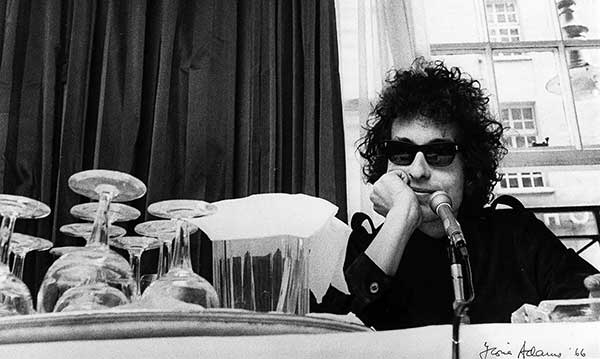
The legendary Bob Dylan may be a divisive character in the world of rock, but surely one thing we can all agree on is that the whole concept of album-oriented music – that is, collections of songs that deliberately attempt to say more than merely ‘I love you/you love me’, the mainstay of pop singles from time immemorial – would simply not have developed as it did without Bob Dylan.
From his bold attempt to raise pop lyrics to the level of poetry came The Beatles’ own decision to leave behind ‘She loves you, yeah, yeah, yeah’ and instead sing about such things as semolina pilchards, and skies full of women named Lucy.
And from The Beatles came... well, everybody else, including, yes, Deep Purple. Indeed, the whole evolution of electric guitar-driven, album-oriented music can be traced directly back to the Dylan/Beatles interface and the explosion of musical (and artistic, political and spiritual) ideas that emanated from their ground-breaking albums in the 1960s.
For without the alchemy Dylan employed to turn the base metal of old folk songs like Scarborough Fair into the shining post-war gold of newly minted ‘originals’ like Girl From The North Country there would never have been the impetus for people like Jimmy Page and Robert Plant to later write songs like Stairway To Heaven.
Born Robert Allen Zimmerman in Duluth, Minnesota, in 1941, Dylan had a voice that sounded old when he was 20; now it sounds positively decrepit. But then no one has followed quite the same, zig-zagging musical path; from folk-protest to rock visionary, to born-again bible thumper, to worryingly lost-soul, to truly reborn songsmith of jaw-dropping dexterity as, now in his late 70s, he considers the onset of his own mortality – a subject no rock artist has yet tackled head-on the way Dylan has on the albums he's made since the turn of the century.
20. Jimi Hendrix
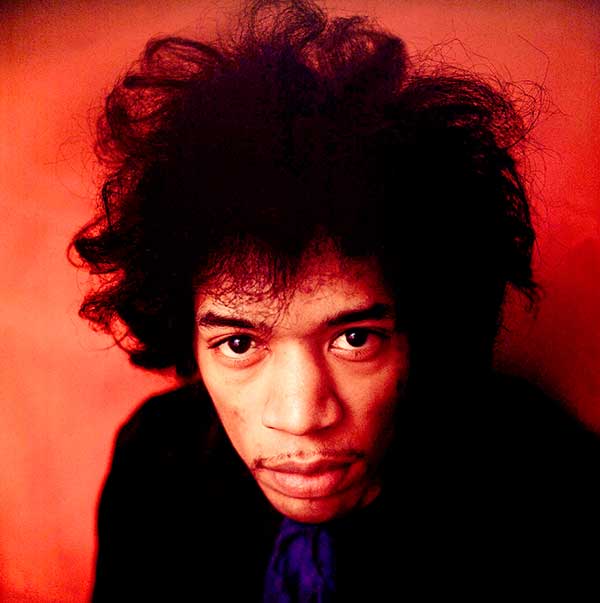
The face of popular music was set to change forever when, on November 27, 1942 in Seattle Washington, James Marshall Hendrix was born. When his father bought him his first acoustic guitar when he was 15, events were set in motion.
After a stint in the army – wherein he formed a band with future Band Of Gypsys man Billy Cox – Jimi Hendrix was honourably discharged and free to pursue his musical ambitions.
Like all the great overnight sensations, Jimi Hendrix took years to get off the ground. His was a long road to fame: from the little boy who, in 1958, used his beat-up guitar to imitate TV cartoon sound effects, to the 1964 guitar-slinger who hired out his talents to Little Richard, The Isley Brothers and others.
By 1965, Hendrix found himself in New York City playing with Richard and Curtis Knight & The Squires. In July of that year, he would meet with The Animals’ Chas Chandler, and it would set the course of Jimi’s short, sharp rise to stardom and rock’n’roll immortality allowing the development of the outlandish psychedelic six-string shaman who flew into London in late 1966.
Within weeks of Hendrix being launched to the Big Smoke’s goggle-eyed media at The Bag O’Nails club on Friday November 25, 1966, virtually every major British blues guitarist found themselves rethinking their musical direction. Inevitably, the purists would continue to recycle the past and the unimaginative would slavishly emulate Hendrix, but a handful of inspired innovators would choose to fashion their own unique styles until, out of that seething maelstrom of creativity, heavy blues would be born.
The amount Hendrix achieved in his seven years as a performer – and the amount he's inspired since his death – is astounding. When he died on 18 September 1970, Hendrix had released only three studio albums, one live album and a hits collection – but he'd completely changed the course of rock history in the process.
19. Yes
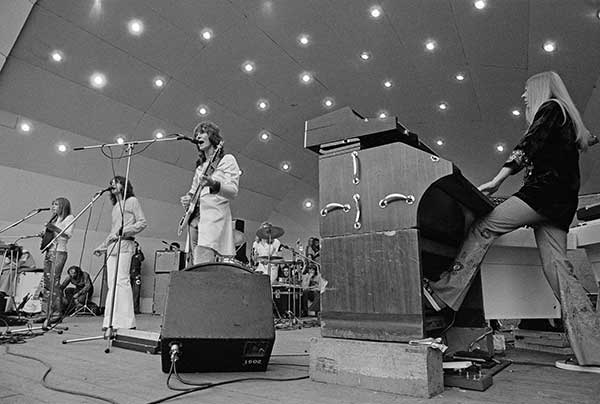
If there's a group that defines the pros and cons of the whole progressive genre, it’s surely Yes. Their back catalogue includes astonishing peaks which are the equal of any music of its type.
The core of Yes was always Jon Anderson and Chris Squire: Anderson’s unmistakeable clear, high vocals and Squire’s trebly and innovatively boisterous bass guitar had been central to all line-ups of the group, until Anderson left in 2008. And now Squire has gone for good.
The often underrated first line-up of Anderson, Squire, keyboardist Tony Kaye, drummer Bill Bruford and guitarist Peter Banks recorded some excellent music. But when Steve Howe replaced Banks and Wakeman replaced Kaye in quick succession it opened up new dimensions in the band’s sound. After Alan White replaced Bruford in 72, Yes had unbroken success for the rest of the decade.
Cracks appeared in late 79 as they attempted to come up with a follow-up to the botched Tormato album and Wakeman and Anderson quit and were replaced by Trevor Horn and Geoff Downes, who’d had hits as pop duo Buggles. That move astonished everyone After this configuration dissolved, Squire and White demoed material with Jimmy Page as XYZ before opting to form Cinema with South African born guitarist/multi instrumentalist Trevor Rabin, the line-up completed by original Yes keyboardist Kaye.
Near to completion of their album, it was felt that Anderson’s return would cap it off vocally and stimulate interest. The resulting 90125 became Yes’s biggest selling album ever.
In 1988, Anderson quit to form Anderson, Bruford, Wakeman And Howe. That foursome would be reabsorbed into Yes for an eight-piece reunion tour in 1991 before the 90125 line-up regrouped.
Rabin subsequently retired from Yes after after more than a decade at the helm, and Wakeman and Howe were re-enlisted. Wakeman left for a brief period, and Billy Sherwood, a guitarist and singer who Squire, White and Rabin had recorded with was brought into the now six-piece version of the band with Russian keyboardist Igor Khoroshev. Wakeman was back by 2002 for a renewed spell of touring.
Since then, the merry-go-round has continued. In 2008 Canadian singer Benoit David joined the band, having previously fronted a Yes tribute act called Close To The Edge, but he left in 2011 to be replaced by Jon Davison.
More recently Anderson, Rabin and Wakeman joined forces in ARW (and then Yes feat. ARW) to play Yes material live. A planned album never came to fruition, and the band disbanded without releasing any studio recordings. Since then, Anderson made noises about working with Yes again, before making a brilliant Yes album without them in 2024's True.
It's complicated. But their impact on progressive rock as we know it? Undeniable.
18. Eagles
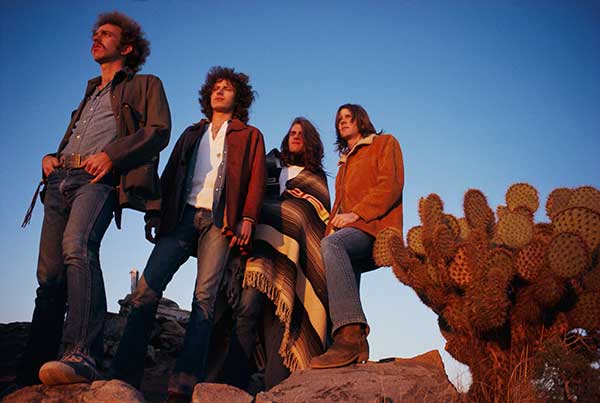
‘Song power’ was their catchphrase – they had it printed on T-shirts. And it was no idle boast. With iconic songs such as Hotel California, Take It Easy and Life In The Fast Lane, The Eagles rose in the early 70s to become one of the biggest rock acts of all time.
In a career that has so far lasted almost 50 years, the band have sold in excess of a whopping 120 million albums worldwide. Until 2009, when the death of Michael Jackson boosted sales of his Thriller, The Eagles had the biggest-selling album in American history with their Greatest Hits (1971-1975), which alone has shifted more than 42 million copies.
Formed in Los Angeles in 1971, The Eagles would define the California rock sound of the 70s with a blend of rock and country music and a melodic sensibility attuned to pop radio. But none of the group’s founding members were native Californians – guitarist Glenn Frey was from Detroit, drummer Don Henley from Texas, guitarist Bernie Leadon from Minneapolis, and bassist Randy Meisner from Nebraska.
While the band members all shared vocals, it was Frey and Henley who were The Eagles’ creative powerhouse from the start. They were the principal songwriters and lead vocalists – on stage, Henley sang lead on many of their biggest hits from behind his drum kit – and it was the two of them who led The Eagles to huge success as other band members came and went.
It was in the second half of the 70s that the band reached their artistic and commercial peak, scoring five US No.1 singles and attaining global superstardom with 1976’s now classic Hotel California. But by 1980 a combination of drugs, money, ennui and ego led The Eagles to split, with Henley calling it “a horrible relief”.
Solo careers followed, Henley’s the most successful. And then, in 1994, the previously unthinkable happened: The Eagles reunited. The 1980 line-up – Frey, Henley, guitarists Joe Walsh and Don Felder and bassist Timothy B. Schmit – recorded the jokingly titled album Hell Freezes Over.
Although Felder was fired in 2001 and Frey passed away in 2016, The Eagles have continued, and while they may not have recorded since the double Long Road Out Of Eden album in 2007, they remain a live act capable of filling stadiums. Close to half a century after taking flight in Los Angeles, The Eagles remain the ultimate testimony to ‘song power’.
17. Aerosmith
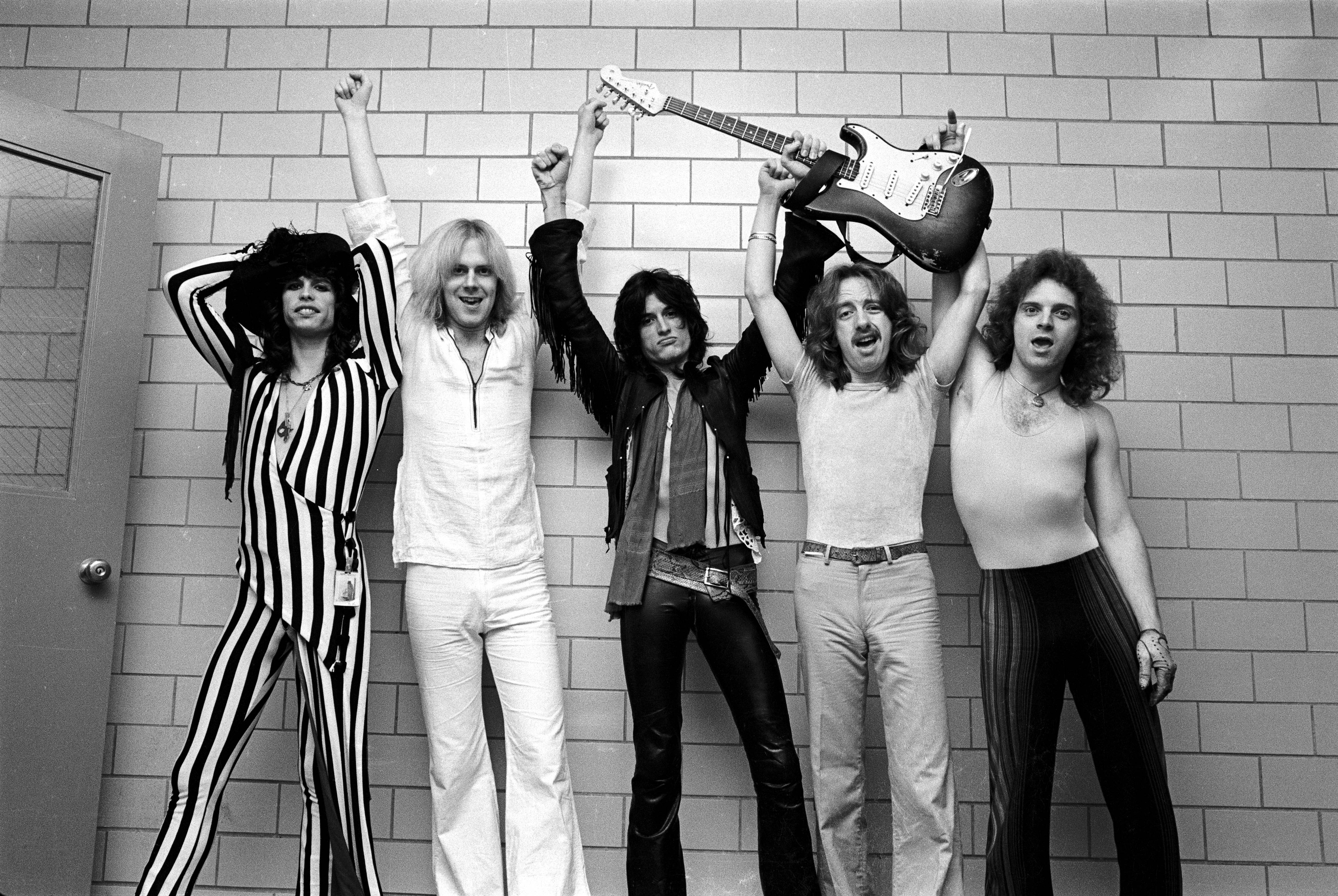
Having formed in 1970, it took Aerosmith several years to shake of the ‘Stones copyists’ tag. Frontman Steven Tyler’s Jagger-esque gob didn’t help, but by 1975’s Toys In The Attic the band from Sunapee, New Hampshire, had carved their own niche and were sounding – and looking – like the band that stadium concerts had been invented for.
Given that in the 70s Tyler and guitarist Joe Perry snorted enough showbiz sherbet to keep the whole Colombian army marching, it’s a wonder they’re still here 50 years on. “It’s totally in the genes, my friend,” Perry said in 2002 by way of explanation. “We’re the worst possible advert for the dangers of drug abuse, because people look at us and say: ‘Okay, you had a great time and made it through, why shouldn’t we try it?’ But it doesn’t work like that.”
Except for a three-year blip in the early 80s, Aerosmith – Tyler, Perry, guitarist Brad Whitford, bassist Tom Hamilton and drummer Joey Kramer – have enjoyed a stable line-up. They’ve also undergone various reinventions.
When in 1986 producer Rick Rubin teamed them with hip-hop act Run-DMC for a reworking of Walk This Way, for example, it paved the way for Aerosmith’s comeback album, Permanent Vacation. Then, the ’Smith collaborated with Eminem. And with the acclaimed album of blues covers, Honkin’ On Bobo, the band retraced their roots.
Aerosmith are a cartoonish institution, and an inherently loveable tour de force who have greatly influenced Van Halen, Guns N’ Roses, Bon Jovi and scores of other hard rock bands. They remained a must-see live act until finally calling it a day in 2024.
“Occasionally I think: ‘Why us? How did we find each other?’” the guitarist has said. We’re just glad they did.
16. Kiss
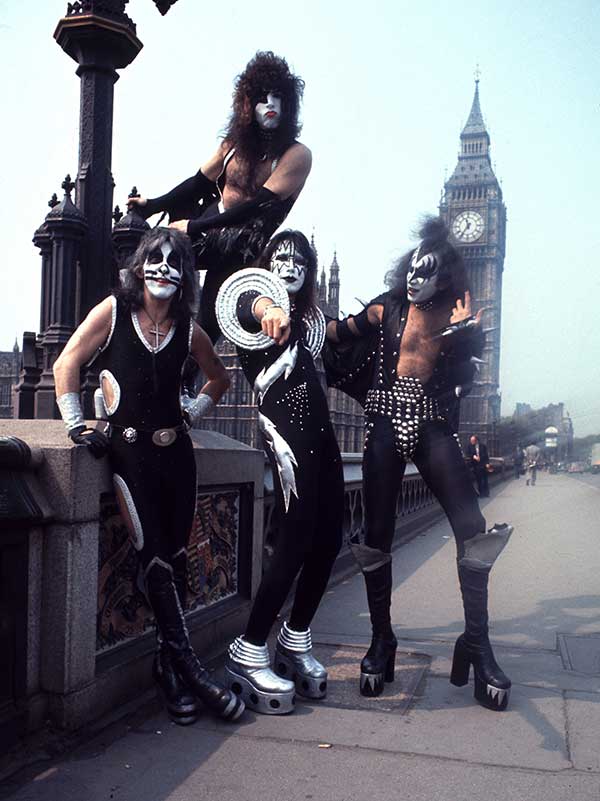
Kiss were not the first rock’n’roll band with a strong visual identity: The Beatles had their mop-tops and dandyish suits. They were not the trailblazers in rock theatre: David Bowie and Alice Cooper went before them. But if there is one band that has understood and exploited the power of image in rock’n’roll, and the importance of putting on a show, it’s Kiss.
With painted faces, outlandish costumes and seven-inch stack-heeled boots, Kiss arrived in the 70s like superheroes straight out of a comic. They had superhero names: rhythm guitarist/lead vocalist Paul Stanley was The Starchild; bassist Gene Simmons, The Demon; lead guitarist Ace Frehley, The Space Ace; drummer Peter Criss, The Catman. What they presented in concert was the greatest show on Earth, with explosions, blood, fire-breathing, a rocket-launching guitar… At a Kiss concert, it was possible to believe a man could fly.
And at the heart of it was a great all-American rock band. While derided by serious music fans (and, of course, critics) as nothing more than a circus act, Kiss didn’t sell 100 million records by fluke. In the band’s vast catalogue are some of the greatest and most influential rock albums of all time.
In the 50 years since the release of the first Kiss album, there have been over 19 more studio albums, numerous live albums and compilations, and – most ambitious of all – four solo albums from the original band members, released on the same date: September 18, 1978.
Much of the classic Kiss material dates from the 70s, but in the following decade – without Frehley and Criss, and more importantly, without the make-up – Kiss rode the glam-metal wave they had done so much to inspire.
When Stanley and Simmons founded Kiss in New York City in early 1973, their primary influences were British, from The Beatles and the Stones through to Led Zeppelin, The Who and Slade. In turn, Kiss influenced a generation of rock musicians, especially in America. Their music was an inspiration for such diverse acts as Mötley Crüe, Anthrax, Pantera and Stone Temple Pilots.
After a lengthy farewell tour, December 1, 2023 in New York City saw the end of the band for good, at least until the avatars arrive. In terms of the legacy they'll leave behind, it's hard to find another quite like theirs.
15. Van Halen
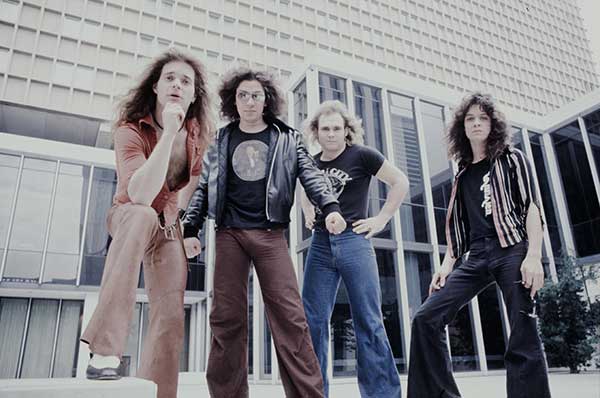
If ever a band epitomised the American Dream, it’s Van Halen.
Formed in Pasadena, California in 1974 by four teenage kids from families that had migrated across the Atlantic in the pursuit of a better life, Van Halen were loud, brash, shamelessly ambitious, larger-than-life, classically all-American. And so was their pioneering spirit.
Van Halen revolutionised hard rock music. When the band’s debut album was released in 1978, punk had unsettled rock’s old order; giants such as Led Zeppelin and Black Sabbath were on their last legs. But Van Halen had seen the future. “This is the 1980s!” declared singer David Lee Roth, boldly if prematurely. “And this is the new sound – it’s hyper, it’s energy, it’s urgent.”
The key to that new sound was Eddie Van Halen, whose innovative two-handed ‘tapping’ technique made him the most influential guitarist since Jimi Hendrix. But Van Halen wasn’t a one-man show. Eddie’s brother Alex went at his drum kit like a prizefighter. Bassist Michael Anthony underpinned Eddie’s histrionics and provided killer backing vocals that had him rightly described as the band’s “secret weapon”.
And then, of course, there was ‘Diamond Dave’, a wisecracking, split-jumping, super-toned blond Adonis, son of second-generation Jewish immigrants, and hard rock’s greatest showman.
With Roth as cheerleader, Van Halen were America’s favourite party band, their high- octane turbo-pop songs the soundtrack to the ‘me’ decade. But when Roth left the band in 1985 amid mutual hostility, much of the magic went with him, even if his replacement, Sammy Hagar, was a better singer.
Nevertheless, the new-look ‘Van Hagar’ proved just as successful as the former model, while Roth’s solo career stalled in the 90s.
Hagar lasted 10 years. His successor, former Extreme vocalist Gary Cherone, was out after one album. Hagar returned for a chaotic reunion tour in 2004, and two years later came the announcement that Roth was rejoining the band with, shockingly, Eddie’s 15-year-old son Wolfgang replacing Michael Anthony. Tragically, Eddie Van Halen died in 2020.
As their placing here confirms, Van Halen’s place in the pantheon of rock acts is secure. With close to 60 million albums sold, they are high on the list of biggest-selling acts in the US. And at their best (with Roth), Van Halen ruled.
14. Def Leppard
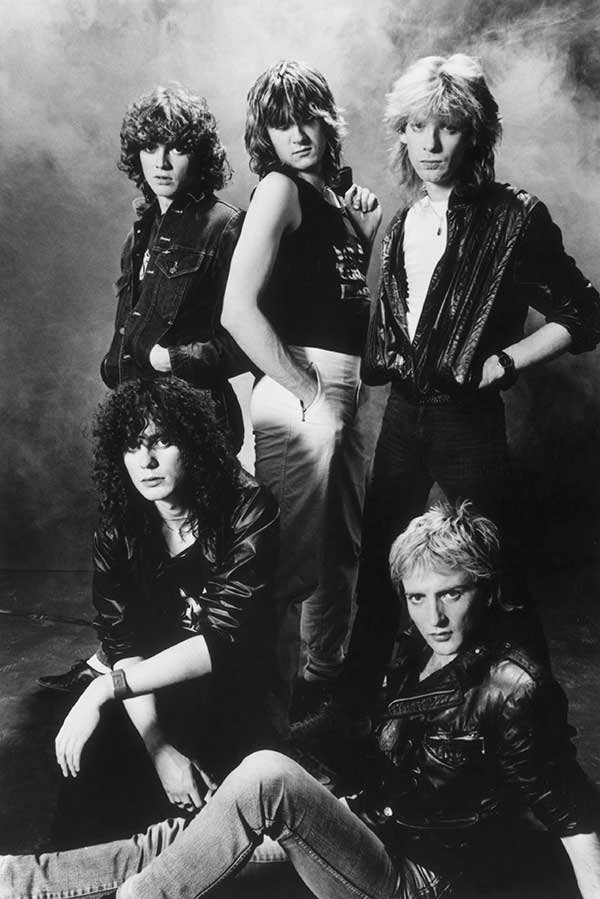
If there’s one rock band, above all others, that can truly be described as heroes, it’s Def Leppard.
AC/DC overcame the death of singer Bon Scott to make the biggest selling rock album of all time in Back In Black. Metallica recovered from the loss of bassist Cliff Burton to become the most successful and influential metal band of the modern era. But Def Leppard have suffered two tragedies: the car crash on New Year’s Eve, 1984 in which drummer Rick Allen lost his left arm, and the alcohol-related death of guitarist Steve Clark on January 8, 1991.
The fact that Def Leppard are still together now, still making great music and playing to audiences of thousands, is testimony to the extraordinary courage and resolve of this great British rock band. In 2022 alone, they played a stadium tour with Mötley Crüe and released Diamond Star Halos, their most successful chart album since 1992's Adrenalize, and Classic Rock's Album Of The Year.
Formed in Sheffield in 1977, Def Leppard were thinking big from the very start. Their name was inspired by Led Zeppelin, and the blueprint for their music was, as singer Joe Elliott has stated: “AC/DC meets Queen”.
In 1979, Leppard rose to prominence alongside Iron Maiden in the New Wave Of British Heavy Metal, although Leppard’s glam-inspired hard rock was radically different to most NWOBHM fare. “We wanted to be a pop rock band,” Elliott says. “We wanted to do what Bowie and Bolan did. We had more in common with Duran Duran than Iron Maiden!”
Leppard knew instinctively where their biggest audience was: they even wrote a song called Hello America. And when they teamed up with AC/DC producer Mutt Lange in the early ‘80s, they hit the jackpot.
With Lange’s creative input earning him unofficial status as the band’s sixth member, Leppard conquered America with 1983’s Pyromania and 1987’s Hysteria, the first albums ever to sell seven million copies back to back. Hysteria even made Def Leppard a household name back in Britain, a proud achievement for a band that famously sported Union Jack t-shirts during their American tours.
13. The Who
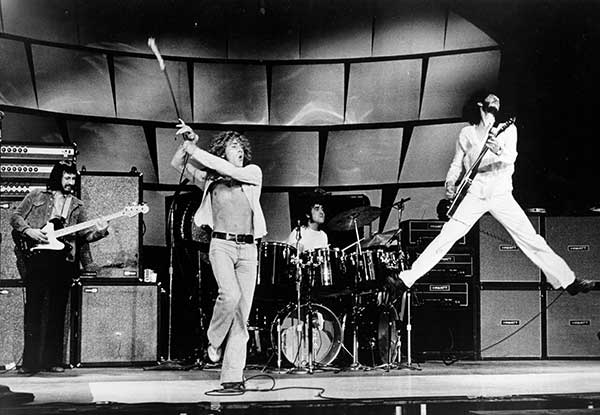
Many of the basics of rock began with the Who: the emphatic clang of Pete Townshend’s guitar, the ardent histrionics of singer Roger Daltrey, the dexterity
of John Entwistle’s bass playing, the exuberant pummelling of madcap drummer Keith Moon. Also as pioneers of longer-form musical ideas from 1966, The Who massively expanded the lexicon of the music.
While Tommy remains The Who’s archetypal concept album, their greatest achievement, Who’s Next, stems from Townshend’s failure to top that idea. He sketched out Lifehouse – a project so complex it made the fractured narrative of Tommy seem as straightforward as their song I Can’t Explain. But finishing Lifehouse proved beyond the limits of his confidence – and the band’s patience (it was eventually completed in its intended form in 1999). But at the time, The Who were left with a batch of extraordinary songs which they captured in a studio with unprecedented clarity and energy – those songs became the Who's Next album.
From the mid-70s onwards, a disenchanted Townshend suffered an unfortunate tendency to publicly disparage his abilities and achievements and also those of the group. The Who initially survived his sour attitude, and even the death of Keith Moon in 1978, replacing this singular drummer with the able yet clearly unsuitable Kenney Jones (ex-Small Faces/Faces), but they eventually disbanded in 1982.
Subsequently there was little activity (the odd bad-tempered reunion such as at Live Aid) until 1989, when they regrouped as an expanded touring unit and worked intermittently. But it wasn’t until the late 90s, when they reconstituted themselves as a compact five-piece with long-term keyboardist John ‘Rabbit’ Bundrick and Moon disciple Zak ‘Son Of Ringo’ Starkey on drums that they began to build the kind of momentum needed to overcome the mental hurdle of recording again.
Those aspirations suffered a massive setback with the death of John Entwistle in June 2002, immediately prior to The Who embarking on a major US tour. Still, they battled on. In 2006 they released Endless Wire, their first new album in 24 years, while their 12th studio album, Who, arrived in 2019. Pete Townshend wants to make another.
12. Guns N' Roses
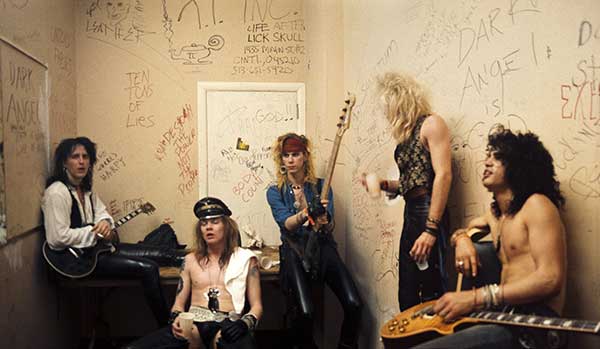
Guns N' Roses were once referred to as ‘The Most Dangerous Band In The World’. Following a career that's spanned over three decades, there isn’t a rock or metal band on the planet that hasn’t been affected by the Hollywood hard rock pioneers.
They were built on chaos. In late 1982, a 20-year-old kid from the hick city of Indiana named Bill Bailey arrived in Los Angeles in search of fame, fortune or anything in-between. One of the first people he met in Los Angeles was another Indiana transplant, an old schoolfriend and budding guitarist named Jeff Isbell. Within a few months, both had renamed themselves: Bill Bailey became Axl Rose; Jeff Isbell became Izzy Stradlin.
They may have had fake names, but Guns N’ Roses were all too real. They waltzed with the Devil down Sunset Strip, danced with Mr Brownstone in long-vanished clubs, and rose above Hollywood on a pillar of flame that would go on to engulf the world.
They were – and still are – the great leveller; a seminal force in rock and metal’s evolution over the past three decades. Ask any musician from any band in any genre, and they’ll pretty much all tell you how important Guns N’ Roses are to them. In terms of music, in terms of attitude, in terms of lifestyle. Thirty years on, the impact of their turbulent inception is being felt as keenly as ever.
Guns N’ Roses didn’t invent rock’n’roll or carnage, but they did perfect it. At their cliché-defying best – that is, at any point between 1985, when they formed, and 1991, when they got so big and bloated you could see them from space – they truly were the most dangerous band in the world. “We were a train wreck,” said original drummer Steven Adler. “But you couldn’t take your eyes off us.”
Guns N’ Roses still exist, of course, though in radically different form. It's been 16 years (and counting) since the wildly divisive Chinese Democracy, though the band are still an active touring concern, and continue to pack out arenas all over the globe.
11. Deep Purple
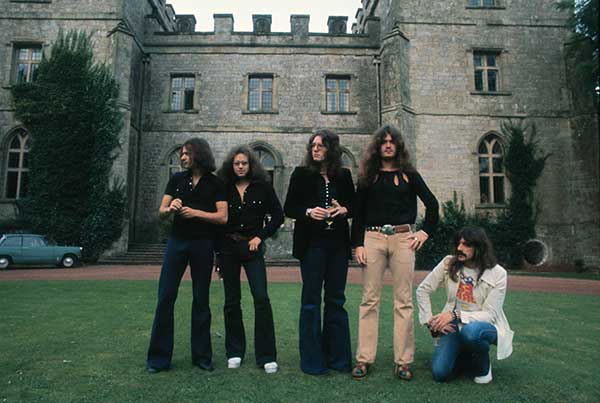
The story of Deep Purple is truly one of rock’s great soap operas. (No wonder they decided to put Fairy Liquid bubbles on the cover of 1973 album Who Do We Think We Are.)
The band’s roots can be traced back to ’68 (some say ’67) when Searchers drummer Chris Curtis contacted London businessman Tony Edwards to pitch the idea of creating a British rock supergroup. Curtis had the foresight, but he also had a penchant for LSD and unpredictable behaviour – as evinced by his decision in ’69 to quit the music business and join the Inland Revenue. (Boy, were people’s tax returns fucked up that year.)
Still, Edwards took up the baton. In cahoots with partner John Coletta, and along with a hot young keyboard player called Jon Lord, he began recruiting musicians to realise Curtis’ somewhat frazzled vision. Briefly called Roundabout (a remnant of Curtis’ plan to form a band around a small core of players, who would be joined by a revolving guest-cast who’d jump on and off a musical ‘roundabout’), Deep Purple debuted in ’68 with their Shades Of… album.
Fearsome tracks such as Mandrake Root and the cover of Hush promised much, but something was amiss; in truth, they couldn’t decide whether they wanted to be Iron Butterfly or the Moody Blues, plus singer Rod Evans’ style was grounded in the hip-swinging 60s.
The arrival in ’69 of frontman Ian Gillan and bassist Roger Glover (replacing Nick Simper) improved things beyond belief. Thus the band’s classic Mk II line-up was born, the new pair joining Lord, guitarist Ritchie Blackmore and drummer Ian Paice in a match made in heaven… and, later, hell. The Purps have always thrived on musical tension, but internal aggravation would eventually rip them asunder. Blackmore and Lord were at loggerheads initially; then the Man In Black turned his flinty-eyed attention to Gillan. Still, that didn’t prevent Mk II reuniting not once, but twice.
All that festering resentment seems a long time ago now, with the current DP line-up – Gillan, Glover, Paice, guitarist Simon McBride and keyboard player Don Airey – seemingly enjoying a new lease of life.
They’ve survived an ill-fated ‘funky period’ spearheaded by onetime bassist/vocalist Glenn Hughes. They’ve reeled from the deaths of US guitarist Tommy Bolin, who some claim was badly suited (well, he did wear kaftans), and Jon Lord. They’ve resisted the clamouring from a small but vociferous hard-core of fans to get Blackmore back in for one final fandango. (As has Ritchie himself, to be fair.)
Deep Purple – specifically Blackmore, Lord, Paice, Gillan, Glover, David Coverdale, Evans and Hughes – were inducted into the Rock and Roll Hall of Fame in 2016, and are continuing world tour dates into 2025. If anything, they're speeding up rather than slowing down.
10. Iron Maiden
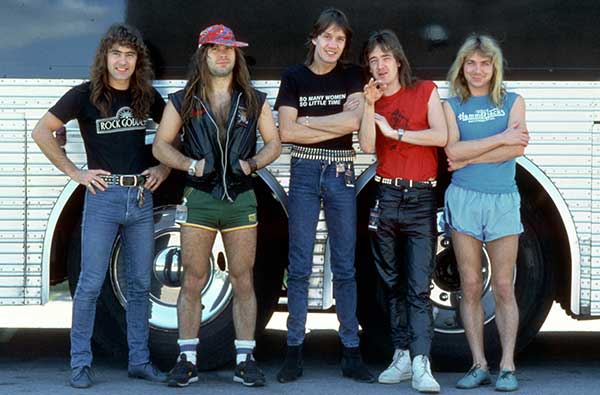
Take a stroll down the pedestrianised shopping centre of any English town and, among the proliferation of Burberry, faceless shops and dog eggs, you’ll find a number of youngsters sporting Iron Maiden togs.
In fact, the face of Eddie – the band’s illustrated mascot – seems to become more widespread with every passing year. Maiden’s renaissance from NWOBHM mainstays to modern metal heroes is complete.
Spooling back the best part of three decades, the concept of what would become one of the biggest bands ever was born from the ashes of just one of many also-rans that litter rock’s highway. The band was Gypsy’s Kiss and their bassist had just left in order to write his own songs. His name was Steve Harris and, as current drummer Nicko McBrain succinctly states on the 2004 Early Days DVD release: “It’s his dream and we’re all living it with him”.
Maiden achieved success in the traditional manner as far as the late 70s goes: through sheer hard work, great live shows, better songs and dollops of that elusive X factor. Even after several significant line-up changes, Harris has never wavered in his steely determination.
From the kinetic 1980 debut onwards, Maiden’s inexorable climb to the very top was, from a outsider’s view at least, totally predictable. Fans who’d see the band maybe three times every year wouldn’t really perceive that they were ever off the road – and when they were, they were recording. For any artist, regardless of medium, to produce a genuine classic each year for a decade, as Maiden did during the 80s, beggars belief. And it was no coincidence that, once guitarist Adrian Smith and, even worse, vocalist Bruce Dickinson had jumped ship, things were going to change.
With new guitarist Janick Gers and the likeable but ultimately hapless Blaze Bayley at the mic, Maiden were reduced from a great band to merely a good one, yet they still didn’t stop. Of course, with Dickinson and Smith back in the fold and Brave New World selling like cold beer on a hot day, it was business as usual: the magic had been reinstated.
In any list of rock’s greatest hits, Iron Maiden will appear on a regular basis and, unlike the majority of their contemporaries, they are still operating at a huge level, selling out enormo-gigs in a matter of hours and nabbing headline spots at the world's biggest rock festivals.
As the aforementioned abundance of Maiden hoodies illustrates, they’re bigger than ever. If a band continues to build on a base of solid gold, not even the sky is the limit.
9. Metallica
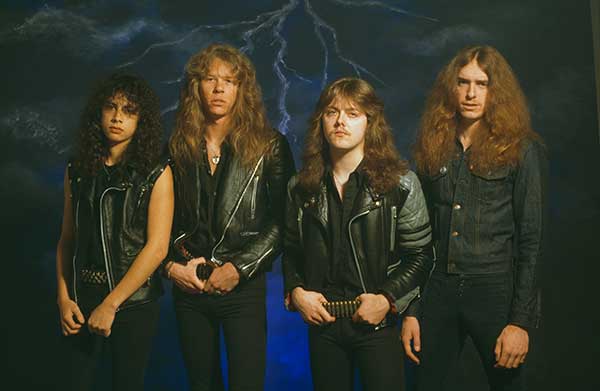
It was just over 40 years ago that British writer Xavier Russell boldly stated: “The world is ready for Metallica. This is where the real future of heavy metal lies.” But in truth, few believed him. Incredible as it now seems, Metallica were initially dismissed as a bit of a joke.
Based in San Francisco – they’d moved there from LA because the latter was full of big-haired poseurs – Metallica were four spotty, bum-fluffed heavy metal herberts whose stated mission was “to bang the head that does not bang”. They were nicknamed ‘Alcoholica’ and the mooted title for their first album was Metal Up Your Ass. Yet this gonzo mentality masked a revolutionary agenda.
As progenitors of thrash metal, the most extreme and influential underground rock phenomenon of the 1980s, Metallica changed the entire fabric of heavy music for generations to come. Moreover, like all true innovators, they were the first to transcend the scene they had created. Developing a more traditional rock sensibility on 1991’s Metallica, aka The Black Album, they became one of the biggest bands in the world.
There have been bad times as well as good. On September 27, 1986, bassist Cliff Burton was killed when the band’s tourbus crashed in Sweden. And in 2001, Metallica were demonised after suing online file-sharing service Napster for copyright infringement.
The ensuing controversy jeopardised the credibility of a band that had prided itself on its anti-corporate ethos. But the biggest battle of Metallica’s career was fought from within: a power struggle between the group’s surviving founder members, drummer Lars Ulrich and guitarist/vocalist James Hetfield, who clashed in 2002 when Hetfield broke from recording St. Anger to enter rehab.
Employing ‘performance enhancing coach’ Phil Towle as mediator, Metallica engaged in a lengthy counselling period, much of it filmed for the documentary Some Kind Of Monster. The movie was at times painfully embarrassing, but the therapy worked. Ulrich and Hetfield resolved their differences. And while St. Anger was weak, the following Death Magnetic put them back on track. With their latest, 2023's 72 Seasons, they credibly created one of the best rock albums of the year.
Of course, Metallica are no longer “the future of heavy metal”. But their influence is still powerful, their legacy a mighty one. Metal up your ass? Nobody does it better.
8. The Rolling Stones
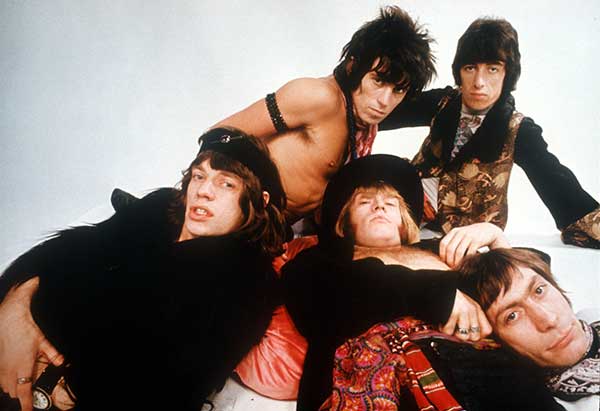
In the late 60s The Rolling Stones claimed a title that has stayed with them for over 50 years: The Greatest Rock ’N’ Roll Band In The World.
The Beatles were more innovative, more popular, more of a cultural phenomenon. Led Zeppelin sold more records. But there has never been a better rock’n’roll band than the Stones.
Foremost, there are the classic songs: (I Can’t Get No) Satisfaction, Jumpin’ Jack Flash, Honky Tonk Women, Brown Sugar, Sympathy For The Devil, Gimme Shelter, Tumbling Dice, Miss You, Start Me Up. Then there are the classic albums: Beggars Banquet, Let It Bleed, Sticky Fingers, Exile On Main St, Some Girls, Tattoo You. But the legend of The Rolling Stones was built on more than music.
There’s the lifestyle: no rock star before or since has enjoyed such a legendary reputation for drug-fuelled rock’n’roll excess than Keith Richards; no other rock star has played the part of international playboy as expertly as Mick Jagger.
There’s darkness: the death of original guitarist Brian Jones in his Sussex swimming pool in July 1969, which is still the subject of conjecture; the murder of 18-year-old fan Meredith Hunter, in December 1969, at the hands of Hell’s Angels at the Stones’ free concert at Altamont Speedway in California.
And there’s controversy: the infamous drug busts; Jagger’s alleged dalliances with Princess Margaret and Margaret Trudeau; the seduction by bassist Bill Wyman of 13-year-old Mandy Smith; the saga of guitarist Ronnie Wood and his young girlfriend Ekaterina Ivanova.
It is now over 60 years since Jagger, Richards and Jones formed a band in London, styled it on American R&B and named it after the Muddy Waters song Rollin’ Stone. They’re old guys now: Mick is 81, Keith 80, Ronnie 77 (Charlie was 80 when he died in 2021). And in recent years, it has become almost obligatory to knock the Stones. Author Will Self, attending a Stones concert in 1999, branded it “a grotesque parody of youthful abandon” – and that was 20 years ago (but everyone knows he's a contrarian – for the record, we quite enjoyed their No Filter tour in 2018). But at their peak – from the mid-60s to the late 70s – The Rolling Stones created some of the most important and influential rock music of all time.
As Mick famously proclaimed, it’s only rock’n’roll. Maybe. But nobody does it better than the Stones.
7. Black Sabbath
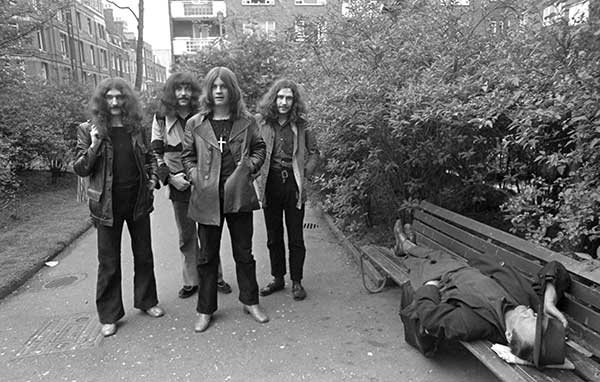
Before Black Sabbath, there were plenty of rock groups that played heavy: the Jimi Hendrix Experience, Cream, Blue Cheer, Iron Butterfly, Led Zeppelin. But the music that Sabbath created in the early 70s was heavier and darker than anything that had come before, and it would prove seminal.
“Black Sabbath are the forefathers of heavy metal,” Rick Rubin said in 2013. “They may well be the heaviest band of all time. And I don’t know of a more influential band other than The Beatles.”
It was in 1969, in Birmingham, that Black Sabbath were formed. The four band members – guitarist Tony Iommi, singer Ozzy Osbourne, bassist Geezer Butler and drummer Bill Ward – had been playing together for a year previously, first as Polka Tulk, later as Earth. “When we started out,” Iommi says, “we were a blues-rock band.”
But one day in 1969 they wrote a song that changed everything. Titled Black Sabbath, after a horror movie starring Boris Karloff, the song was based on an Iommi riff that incorporated the tri-tone known as ‘the devil’s interval’. The lyrics warned that ‘Satan’s coming round the bend’. And with this as their calling card, the band – now renamed Black Sabbath – would open up a new frontier for rock music.
Much of Sabbath’s legendary reputation rests on the first six albums recorded by the original and classic line-up. “It was a completely original sound,” Rick Rubin said. “Riffs as powerful as they come, Ozzy’s one-of-a-kind vocal delivery, cool words, great rhythmic interplay.”
In a career that clocked in at 50 years – the band put an end to their life as a band in 2017 – a total of 19 Black Sabbath albums were released. Some of them were great, some of them average, and some downright embarrassing. The best Sabbath albums made during Ozzy Osbourne’s long absence featured the singer who replaced him after he was fired in 1979 – Ronnie James Dio. And every Sabbath album, from 1970 to 2013, has been shaped by Tony Iommi, the band’s sole ever-present guitarist, and the undisputed master of the heavy metal riff.
Black Sabbath’s influence has carried across generations, through era-defining bands such as Judas Priest, Metallica, Slayer, Guns N’ Roses, Pantera, Soundgarden and Queens Of The Stone Age. But, even after all these years, there’s still nothing quite like the real thing.
6. The Beatles
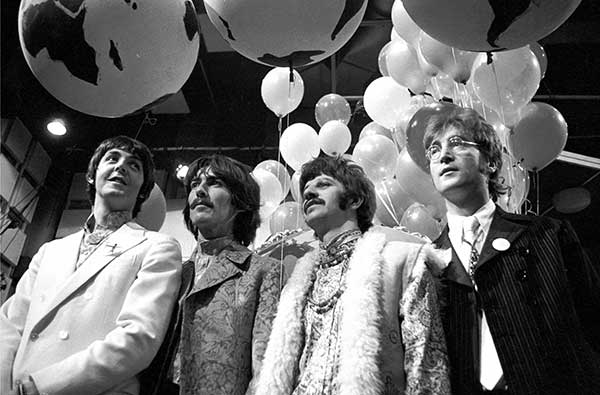
The legacy of The Beatles transcends generations and strides unfettered across cultural divides. The mere mention of the name, and the individual members, dead or alive, opens doors and builds bridges around the world (as Paul McCartney is fond of saying, “nobody is Beatle-proof”).
Strange, then, that the Fab Four have sometimes hit a brick wall in Classic Rock, with the voice of the reader who argues that John Lennon, McCartney, George Harrison and Ringo Starr should be this magazine’s bread-and-butter often drowned out by the admonitory comments that follow the band’s fleeting appearances in these pages.
The issues taken with The Beatles are many, varied and not always of their own making. There’s the crushing ubiquity, of course, coupled with the patronising finality with which Beatles fans declare them the ‘best’ or, worse still, ‘most important’ group in history.
There are the unbearably twee moments of the back catalogue (Yellow Submarine, say, or Rocky Racoon), the memories of McCartney mugging through Yesterday, and, indeed, the hangdog figure cut by the bassist in modern times. The tailored suits. The whimsical films. Yoko Ono.
But step back from the context. Clear your head of the fog of hyperbole. Allow yourself to listen to The Beatles as a band rather than as a cultural phenomenon, and you’ll remember just how much attitude, wit, sweat, eloquence, melody and – perhaps above all – sheer diversity they packed into their short career.
It’s reasonable to say you hate some Beatles songs; albums, even. But to claim there’s nothing in their staggeringly eclectic catalogue that moves you is tantamount to admitting you’re bored with music itself. Of course, the context always catches up with you in the end.
At a time when most popular performers were still mouthing the words of the Brill Building writers, The Beatles (along with Bob Dylan) led the way for any band who ever seized the reins of their art, strived to address the physical, spiritual and political world around them, and forced themselves to evolve in the face of commercial pressure to stay the same.
The Beatles did all that, in just eight years, and left behind a pile of tunes that simply towers over other artists.
5. AC/DC
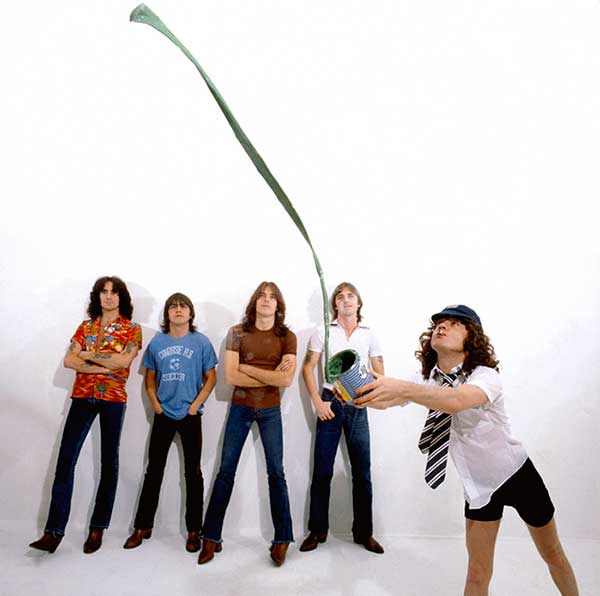
If there's any band that personifies the pursuit of rock'n'roll in its purest sense, it's Aussie larrikins AC/DC. Since their earliest days in Sydney to their current incarnation as one of the world's biggest selling artists, their course has been unwavering.
For five decades they've ploughed a singularly individual furrow, ignoring whatever the mainstream had to offer, letting fads and fashions pass by untroubled.
Instead, they've concentrated on riff and rhythm, allying one of rock's most rock-solid musicians to one of its most live-wire performers. At the back, the late Malcolm Young built a backbone that could make a metronome sound erratic. And everywhere else you'd find his younger brother Angus Young, as capable of incendiary soloing as he is at churning out epoch-defining riffs.
And then there's the singers, both extraordinary: the lascivious, menacing, comical Bon Scott and his replacement, the jocular, razor-throated Brian Johnson.
And throughout their careers? Songs. Proper songs. Classic songs. Anthemic songs. The kind of songs you can play at weddings, where people who profess to hate rock music will bellow along with enormous, joyous gusto.
As with many bands on this list, there have been bad times as well as good. The biggest shock came first – the sudden death of vocalist Bon Scott in 1980. It was Angus and Malcolm who held AC/DC together after Scott's death – until, 34 years later, Malcolm succumbed to dementia and eventually passed away in 2017.
Then came the exit of drummer Phil Rudd, after he was charged with threatening to kill and possession of illegal drugs. And finally, the most surreal turn, when singer Brian Johnson was forced to withdraw from the Rock Or Bust tour – or risk permanent deafness – and was replaced for the remaining shows by Axl Rose.
Even now, so many years later, even without Malcolm around, Angus doesn’t look like he’s about to give up on the band that the brothers formed in Sydney, Australia in 1973, when he was just 18, and the band toured Europe – with Johnson back in place – in 2024. The bottom line is that AC/DC’s future will be decided by Angus Young alone – the band’s sole remaining founder member, their totemic lead guitarist and, in his big brother’s absence, the boss.
In all these years AC/DC’s music hasn’t changed much, and that single-minded vision has served them well, with more than 200 million records sold. The basic blueprint that AC/DC laid down on their early albums with Bon Scott – hard, no-nonsense, riff-driven rock’n’roll – has sustained them all the way through to now. Long may it continue.
4. Pink Floyd
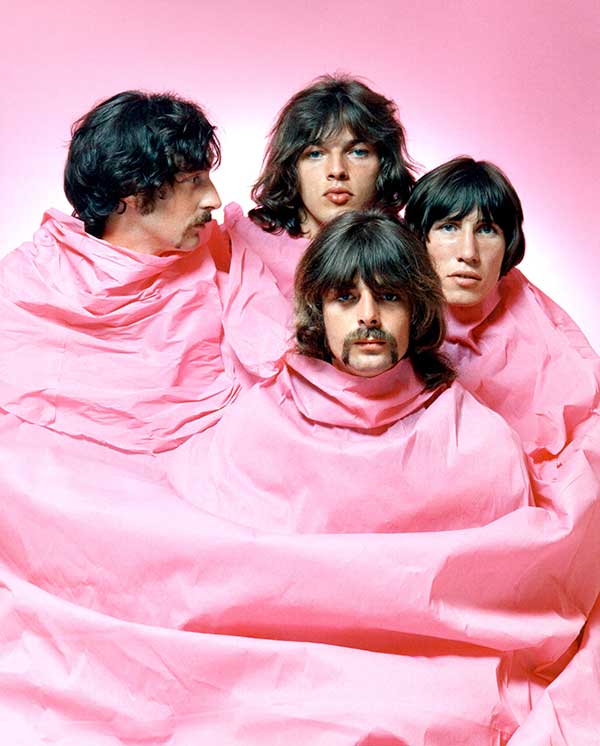
It’s difficult to overstate the influence of Pink Floyd as a defining force in rock culture. And it’s not just about the number of records they’ve sold. You can reel off pages of statistics concerned with the success of The Dark Side Of The Moon, but that doesn’t tell you why that album – both the music and the album sleeve itself – from 1973 became an icon for a generation. Or why Pink Floyd became a phenomenon that has affected every generation since.
The answer is that they have made some of the most amazing, most singular music in rock. The punks may have hated the band and what they often (wrongly) perceived they stood for, but Pink Floyd’s bile against the system was often as venomous as anything the punks could spit out.
And through the 80s and 90s, angst-ridden teenagers, including legions who later would also make an impact with their own music – from Axl Rose to Trent Reznor to Billy Corgan to Noel Gallagher – grew up listening to The Wall. Pink Floyd had an impact on them all.
There have been four distinct phases in Pink Floyd’s career. The first was the Syd-Barrett-led band, which came together in late 1965 and lasted for just three singles and one album before Barrett fell apart at the end of 1967 and was forced to leave the band. And for some people, Pink Floyd ended at this point.
Then there was the Pink Floyd that picked up the pieces and spent five years groping for a suitable direction, before Dark Side Of The Moon went supernova and transformed their fortunes and replotted their future. After five hugely successful albums increasingly dominated by Roger Waters, the whole thing disintegrated with sullen rancour at the start of the ’80s.
And then there was what became phase three, after Pink Floyd was retrieved by guitarist David Gilmour (who had replaced Syd Barrett) and restored to their pre- eminent position in the rock hierarchy.
A belated fourth phase came in 2015, 20 years after many had assumed that Gilmour had wound up the band, with the release of The Endless River, a record that the guitarist has said definitively marks the end of the Pink Floyd journey (although a one-off single, Hey, Hey, Rise Up!, emerged in 2021).
Throughout it all, Pink Floyd have maintained a ‘corporate’ identity while remaining anonymous individually; it’s doubtful whether you would recognise a member of the band on the street – something which has simply added to their enigma.
3. Rush
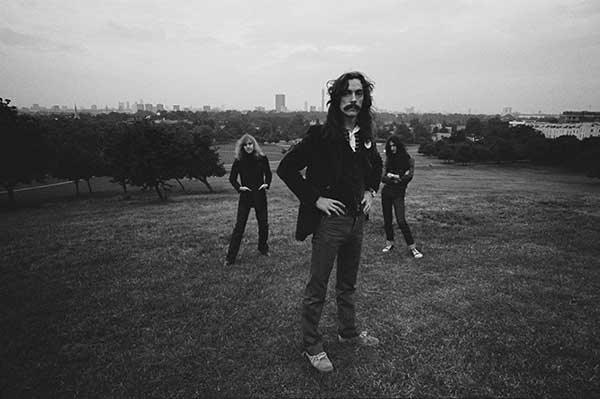
It’s hard to believe that when Rush released their debut in 1974 everyone had them pegged as Led Zep copyists.
Fifty years and a zillion albums later, it’s harder to judge which is more unlikely: (a) that they lasted so long or (b) that they’ve done so on the strength of hiring drummer/lyricist Neil Peart to replace the long-forgotten John Rutsey.
Rush’s four decade run is a riddle, wrapped in a mystery, inside the enigma that is the famously fan/limelight-avoiding and well-read Peart. Yet Rush were a three-piece band of equal parts, and similar attention is long overdue for Geddy Lee and Alex Lifeson.
Although frequently derided for his occasional choice of high-register singing, Lee has a fine, folky voice; he’s no slouch on a synth, either. Moreover, as his excellent solo album My Favorite Headache (2000) proves, much of Rush’s often overlooked mastery of melody is down to him. And all that before the best bass playing you’ll find this side of Jack Bruce. Lifeson, too, is an under-appreciated player, and deserves to be ranked alongside David Gilmour for his fluid soloing, and Jimmy Page for other-worldly riffs.
Lee and Lifeson’s qualities added to Peart’s prodigious talents for rhythms usually found outside the rock sphere have inspired a collective ambition to improve and expand their abilities, and to make music that is always evolving, never safe.
Rush’s first 25 years can be viewed in three (unplanned) cycles, each comprised of four studio albums then a double-live set which seemed to herald a change in direction. From 1974-76 they rocked like bastards while peddling sword, sorcery and sci-fi – often on side-long epics. From 1977-81 they entered a purple patch when they discovered synth bass pedals, keyboards, and songs lasting less than 10 minutes. Cycle three, 1982-89, began with more of the same, but is typified by an initially unsettling penchant for reggae-style rhythms. They also fully embraced the 80s vogue for electronica.
After the third double live album, the cycles ended and studio output became sporadic. Over these they’ve steadily stripped away the trimmings and gone back to basics, finding a way to grow older gracefully, and in their last album – 2012's Clockwork Angels – they made one of the finest rock albums of the 2010s.
Due to the death of Neil Peart in 2020, it looks like Rush really has come to an end. But what a legacy they leave behind.
2. Queen
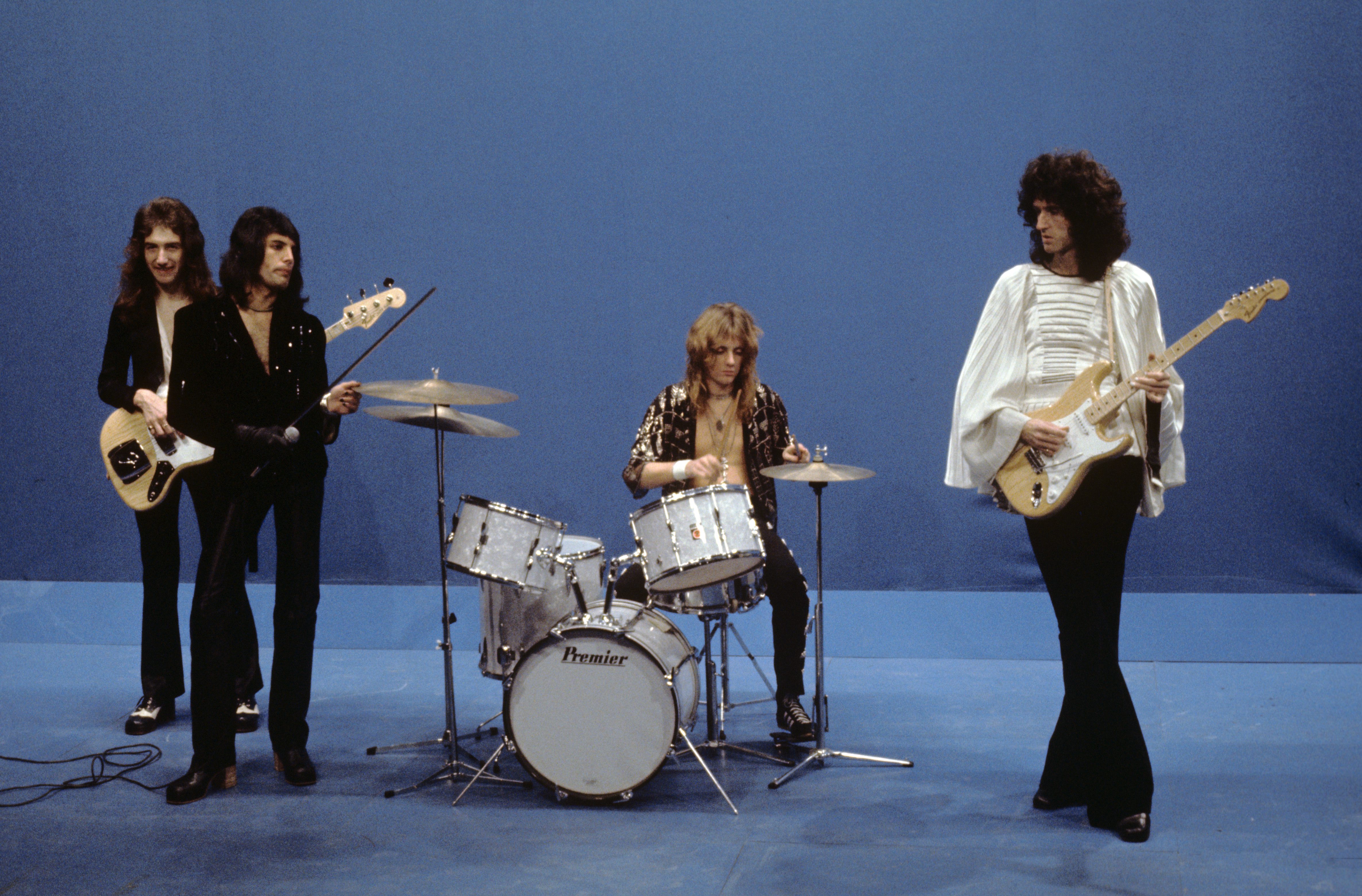
Queen were such a uniquely talented band that genre identification is virtually impossible. They could certainly rock as hard as anyone, but there are also elements of metal, jazz, funk, opera, vaudeville and ragtime in their music.
In the 20-odd years they were on the scene, from their inception in 1970 to the tragic death of frontman Freddie Mercury in 1992, Queen constantly reinvented themselves, pushing the envelope as their matchless musicality complemented the outrageous showmanship of Mercury.
Queen’s intelligence and acuity demanded that they constantly took risks. But almost all of them came off. And none more so than Bohemian Rhapsody, one of the most remarkable hit singles ever.
These days the track is something of a cliché, thanks in no small measure to Wayne’s World and to the award-winning film of the same name, but when it first hit the chart it defied convention in terms of length, lyricism and musical influence.
Subsequently, Queen became iconic – individual yet such a huge influence on much of what’s happened musically in the past quarter-century. They scarcely put a foot wrong as the music developed in surprising directions. Even 1982’s Hot Space excursion into the dance realm wasn’t a complete failure.
More than three decades on from Mercury's death, Queen's stock is higher than ever.
1. Led Zeppelin
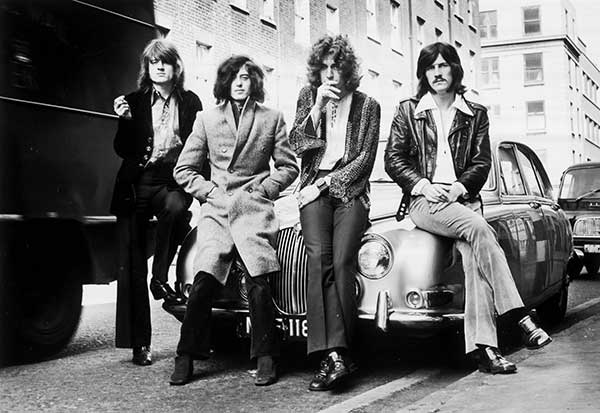
Was there really ever any other way this would end? Sure, there are worthy contenders all the way through this list; bands you could credibly argue should be in with a shot at the top spot. But when the chips are down, and push comes to shove, there's really only one way this could've gone: Led Zeppelin are the greatest rock band in history.
Let's take it back to the beginning. At the start of 1968, rock’s original prime movers were flagging, and another generation of bands were ready to step into their shoes and crank their amps way up.
When they’d finished, a whole new genre had been born.
As far back as 1967, the likes of Jimi Hendrix, Cream and The Who had turned rock upside down, redrawing the boundaries of what could be done within music. But by 1968 all three found their creative juices becoming increasingly sapped by the demands of endless touring, especially in America.
Waiting in the wings were two former Yardbirds guitarists with big plans. One was Jeff Beck, whose eponymous Group released their debut album, Truth, in August 1968, laying down the template for what was to come. The other was Beck’s old oppo, Jimmy Page, who was putting together his new band, initially dubbed The New Yardbirds.
By the time Page had joined forces with Robert Plant, John Paul Jones, and John Bonham and settled on a new name – Led Zeppelin, taken from a supposition from Keith Moon that their band was destined to go down like a ‘lead balloon’ – the Zep were already way ahead of the curve compared to other bands.
The revolution really began on 12 January 1969, when Led Zeppelin released their first album. It reached its crescendo on 22 October that year, when they released the follow-up, Led Zeppelin II. Both heavier and more textured than their debut, it far outstripped the success of its predecessor. Their label, Atlantic, received advance orders of 400,000 copies – nearly 10 times as many as Led Zeppelin I. It peaked at No.1 in both the UK and the US. The musical revolution they had started had now officially gone worldwide.
It was a very British revolution, starting in pubs and clubs across the land before going on to conquer the stadiums of the world. By the time the dust had settled, nothing would be the same again.
Zeppelin’s hugeness was preposterous, and as their fame ballooned, their artistic vision expanded to match. Ever more epic live shows were marked by extensive improvisations by four virtuosi whose inspired ensemble interplay seemed almost supernatural in origin. Audiences broke records, albums camped out at the top of charts and during their 12-year existence, Led Zeppelin casually conquered Earth.
Then, in 1980, it all came to an end. Following Bonham's sudden death in September that year, the group decided to disband, confident they "could not continue as we were". There have been reunions since – only four, though – including the ill-fated Phil Collins Live Aid debacle and their triumphant Celebration Day reunion, and a number of solo projects pursued. Still, none of it's come close to matching what those four people were capable of creating together in their prime.
It's only right that they're at the top of this list. Your favourite band most likely wouldn't exist without them.
Classic Rock is the online home of the world's best rock'n'roll magazine. We bring you breaking news, exclusive interviews and behind-the-scenes features, as well as unrivalled access to the biggest names in rock music; from Led Zeppelin to Deep Purple, Guns N’ Roses to the Rolling Stones, AC/DC to the Sex Pistols, and everything in between. Our expert writers bring you the very best on established and emerging bands plus everything you need to know about the mightiest new music releases.

